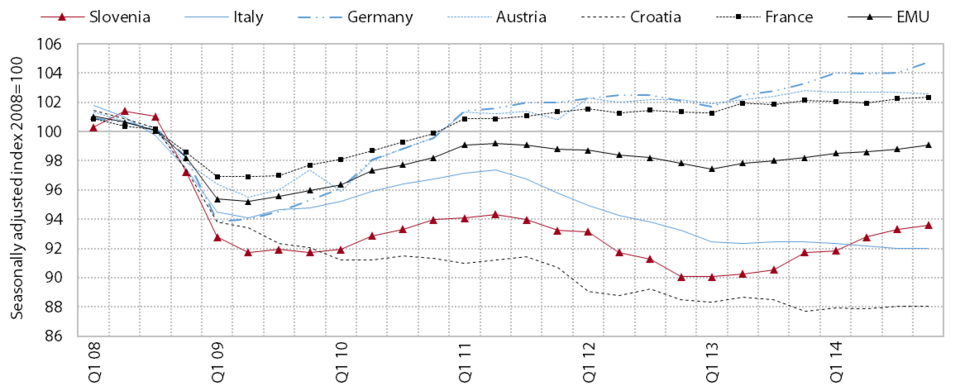Development Report
Related Files:
Development Report 2015
The year 2014 was marked by positive shifts in terms of economic development, the deterioration in the material position of households was halted, while pressures on the environment eased during the crisis, mainly under the influence of weak economic activity. To ensure more permanent economic growth and sustainable convergence to more developed countries, and to maintain the quality of life and the environment, more radical structural changes will be necessary.
Related Files:
Being one of the EU countries that suffered the greatest deterioration in relative economic development during the crisis, Slovenia will be able to catch up with the EU average only by a more lasting improvement in the competitiveness of the economy. The crisis also disrupted macroeconomic balances, which are improving only gradually. The general government deficit is narrowing slowly, while the quality and sustainability of consolidation are weakened by the temporary nature of measures. Public debt has already exceeded the ceiling set within the broad Stability and Growth Pact framework in the EU. The banking system, where an intensive restructuring process is underway, has yet to provide the sources of funding necessary for faster growth. Creating a stable macroeconomic framework and ensuring funding, together with the completion of corporate restructuring and privatisation, will be the basis for a further strengthening of the competitiveness of the economy. This has improved significantly in recent years, but the positive movements were insufficiently based on an increase in value added. Improving competitiveness by greater use of knowledge to raise value added of the economy is also vital for the creation of high-quality jobs and improvement in labour market conditions. The decline in employment and increase in unemployment during the crisis have contributed to a significant deterioration in the material living conditions and social inclusion of households. Welfare is also increasingly jeopardised by social protection systems not being adjusted to the ageing of the population. Environmental development is marked by the relatively high energy and emission intensity of the economy, which could jeopardise the attainment of long-term objectives in this area when economic growth recovers.
Priority measures should be focused on:
- Establishing a medium-term development framework and improving the performance of the government and its institutions in making and executing development decisions;
- Increasing the value added of the economy and creating high-quality jobs by boosting the innovative capacity of businesses, matching human capital with the needs of a more competitive economy and providing a business environment that fosters entrepreneurship;
- Establishing an effective state asset management system, including further privatisation of state-owned enterprises;
- Sustainable fiscal consolidation, with emphasis on more permanent measures for reducing expenditure;
- Adjusting social protection systems to the needs of a long-living society and the relationship between public and private sources of funding to ensure the quality of public services and fiscal stability in the long term;
- Completing banking system stabilisation, carrying out comprehensive corporate restructuring and increasing equity capital, and development of non-bank financial sectors;
- Increasing labour market efficiency, particularly in the areas of labour reallocation and wage flexibility, improving the transition of young people to the labour market and increasing the employment rate of older people;
- Reducing environmental pressures by more efficient use of energy and raw materials, focusing on measures promoting sustainable mobility.
Slovenia's development - Indicators:
- Macroeconomic framework
- Factors of competitiveness
- Demographic changes and the welfare state
- Environmental, regional and spatial development
After two years of decline, in 2014 GDP recorded the largest increase since the beginning of the crisis (2.6%). Export growth strengthened significantly last year, reflecting growing foreign demand, improved cost competitiveness in the tradable sector and certain one-off factors. Exports thus remained the main driver of economic recovery, their growth since the beginning of 2013 being one of the strongest in the EU. Another significant factor in last year’s GDP growth was investment, particularly investment in public infrastructure related to the accelerated drawing of EU funds before the expiry of the previous financial perspective. Private investment in machinery and equipment declined on average in 2014, but positive trends started to be seen during the year. With increased employment and average gross earnings, household disposable income rose last year after two years of substantial decline, which was reflected in a modest rise in private consumption; consumer confidence also improved. Government consumption fell again as a result of the ongoing fiscal consolidation. In 2014, economic growth also strengthened at the EU level (1.4%), with domestic consumption making a greater contribution than in previous years. Despite the favourable developments in 2014, Slovenia remains in the group of countries where economic activity declined the most during the crisis. In 2014, the average GDP in the EU was similar to that in 2008. Slovenia’s gap with the pre-crisis level was 7.1%, wider gaps being recorded only by Greece, Croatia, Cyprus and Italy.
GDP in Slovenia and its main trading partners
2 Inflation
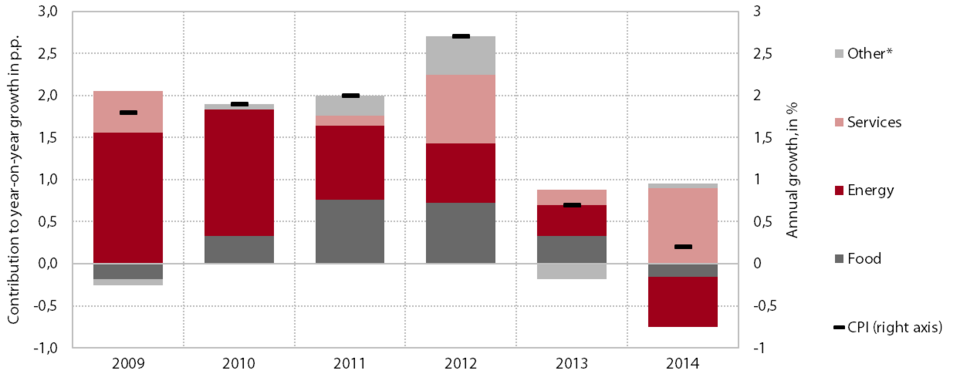
Amid a decline in commodity prices on global markets, inflation in 2014 was the lowest since independence (0.2%) in spite of the weak recovery in domestic demand. Last year’s price movements were significantly impacted by a decline in global commodity prices (oil prices in particular). This was reflected particularly in the year-on-year fall in energy prices. Food prices were also slightly lower (unprocessed food in particular). In contrast to the previous five years, when food and energy prices contributed 1.4 percentage points to annual inflation, on average, their total contribution in 2014 was negative (-0.8 percentage points). Another factor in the low inflation was a further decline in prices of durables, whose contribution (-0.2 percentage points) remained at the 3-year average amid the still weak domestic demand. Among the groups of prices that rose in 2014, service prices stood out. Their contribution increased significantly relative to 2013 (by 0.7 percentage points) on account of a one-off factor at the end of the year. Price growth was also influenced by tax policy measures, which contributed around 0.4 percentage points to inflation in 2014 (0.8 percentage points in 2013). Similar price dynamics – which also triggered further action from the ECB – also marked the euro area, which recorded -0.2% deflation in December 2014.
Contributions to year-on-year growth in consumer prices in Slovenia
3 Balance of payments
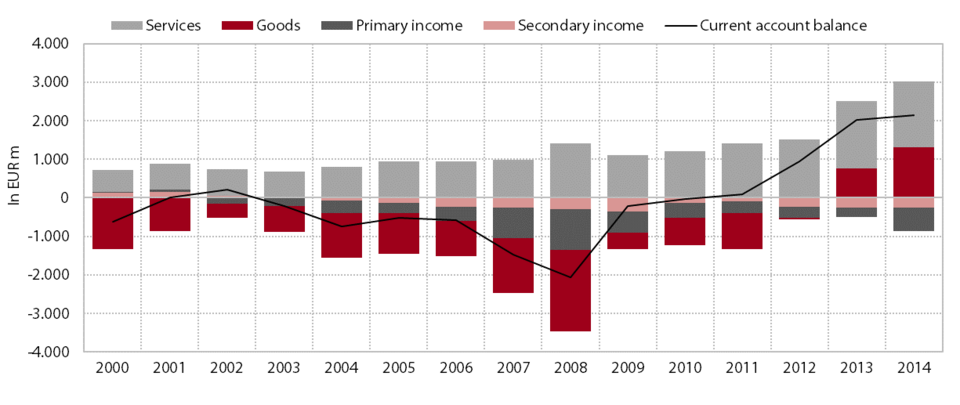
The current account of the balance of payments of Slovenia, which recorded a significant deficit at the beginning of the crisis, moved into a large surplus, which rose for the fourth year in a row particularly due to changes in the balance of trade in goods. The current account, which remained close to balanced in the first three years of the economic crisis, has been in surplus since 2011. In 2012 and 2013 as a whole, the surplus widened by almost EUR 2 bn, while last year its growth eased and it reached EUR 2,150 m (5.8% of GDP). Amid significantly stronger growth in exports than imports, the wide surplus in current transactions mainly reflects net savings by the private sector. On the other hand, the deficit in current transactions of the government sector was up again last year owing to a significant increase in expenditure on interest payments. The surplus in the balance of trade in goods, which has contributed the most to changes in the total balance since the beginning of the crisis, rose further in 2014, by EUR 544 m to EUR 1,307 m. Aside from quantity factors as export growth outpaced imports in real terms, the increase was once again due to the terms of trade, which was mainly attributable to a decline in import prices of manufactured goods, energy and raw materials. The surplus in trade in services narrowed by EUR 48 m to EUR 1,707 m last year, but nevertheless still made the greatest contribution to the current account surplus. The narrowing in 2014 was largely attributable to a higher deficit of trade in other business services. The surplus in trade in travel services also declined, as revenue from non-residents’ travel remained at the previous year's level, while domestic household spending abroad increased after three years of decline. The deficit in primary income widened in 2014 for the first time since the onset of the crisis and totalled EUR 612 m, EUR 369 m more than in 2013. Within that, the net inflow of labour income was up owing to higher income of daily migrants. Net interest payments rose even more due to increased borrowing of the government by issuing securities abroad. The deficit in secondary income remained similar to last year for the second consecutive year.
Components of the current account of the balance of payments
4 Gross external debt
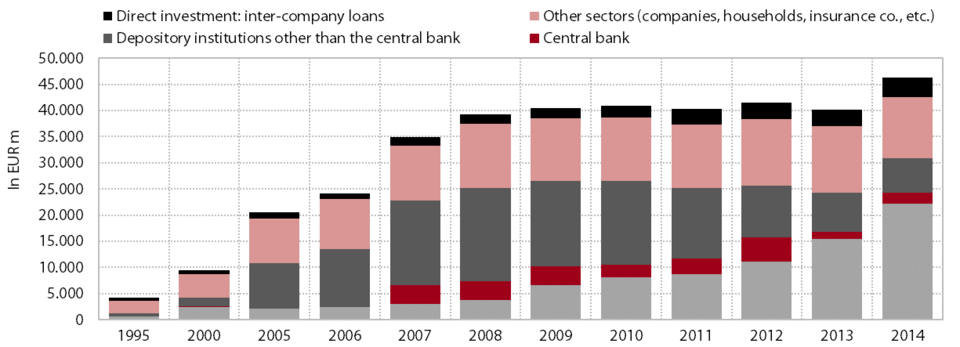
Having maintained a similar level since the onset of the crisis, gross external debt rose in 2014 as a result of faster growth in general government debt, while the deleveraging of commercial banks slowed significantly. At the end of 2014, total gross external debt stood at EUR 46.2 bn, up EUR 6.0 bn over December 2013. It increased as a result of higher long-term debt, which accounted for four fifths of total debt in 2014. The external debt of the government sector recorded a significant increase again, the largest since the beginning of the crisis (by EUR 6.7 bn to EUR 22.1 bn). The deleveraging of commercial banks abroad is gradually slowing, partly as a result of considerably lower debt, which amounted to EUR 6.6 bn in 2014, EUR 11.3 bn less than in 2008. In 2014, commercial banks continued to repay foreign loans, while non-residents were withdrawing their deposits from Slovenian banks. The external debt of other sectors (mostly non-financial corporations–enterprises) also declined last year, by EUR 1.0 bn, largely due to loan repayments and partly owing to short-term trade credits and advances. The growth of gross external debt was attributable to inter-company loans within direct investment, which increased by EUR 0.4 bn to EUR 3.7 bn. The central bank’s debt also expanded last year, chiefly owing to higher short-term liabilities (currency and deposits). At the end of 2014, public debt accounted for approximately half of gross external debt, an increase of 38.4 percentage points over 2008; publicly guaranteed debt, which rose by EUR 1.5 bn to EUR 6.9 bn, represented 14.5%, 1.2 percentage points more than in 2008. Non-guaranteed private sector debt declined by EUR 13 bn relative to 2008 and stood at EUR 17.2 bn at the end of 2014.
Structure of Slovenia’s gross external debt by sector
5 General government balance
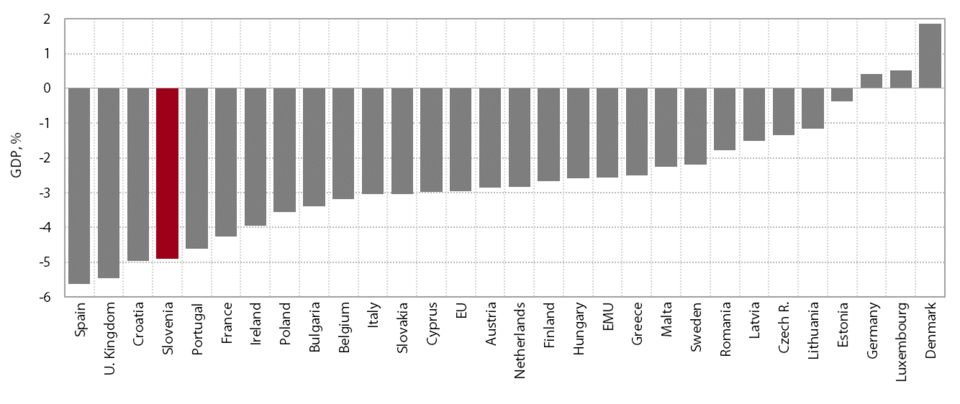
Amid significantly lower one-off expenditure on bank recapitalisations, the general government deficit declined substantially in 2014 (to 4.9% of GDP); the deficit excluding one-off factors also narrowed (to 3.3% of GDP). Expenditure on bank recapitalisations, which accounted for 10.1% of GDP in 2013, totalled 0.9% of GDP in 2014, while the other one-off factors, including the payments to depositors of LB in Croatia and Bosnia and Herzegovina, totalled 0.7% of GDP. The deficit without one-off expenditure, which declined for the first time in 2012, reached the lowest level since 2008 in 2014 and the primary balance was balanced for the first time since the onset of the crisis. The narrowing of the deficit excluding one-off factors was attributable to the rebound in economic growth and government measures to increase revenues and reduce some expenditures. Among tax revenues, revenue from taxes on production and imports increased the most, particularly under the impact of higher VAT revenue after the increase in tax rates in the middle of 2013. Taxes on income and property also recorded modest growth after five years of decline. The improvement on the labour market, together with the broadening of contribution bases, restored growth in revenue from social contributions, which had previously been falling for two years. Among revenues not arising from taxes and contributions, receipts of EU Cohesion Policy funds rose most notably in 2014. In 2014, similar to 2012 and 2013, fiscal consolidation on the expenditure side relied on measures that reduced subsidies, compensation of employees and expenditure on social benefits in cash and kind (with the exception of pensions); in 2014, the latter declined also due to the improvement on the labour market. General government expenditure on goods and services, which had also declined in the previous two years, rose slightly in 2014. Among expenditure categories that rose in 2014, interest payments stand out again, recording an even larger increase than in 2013; pension expenditure was also up, but less than in 2013. A significant turnaround, which already had a positive impact on economic activity in 2013, is the increase in government investment, which accelerated notably in 2014 amid faster absorption of EU funds.
General government deficit/surplus in EU Member States, 2014
6 General government debt
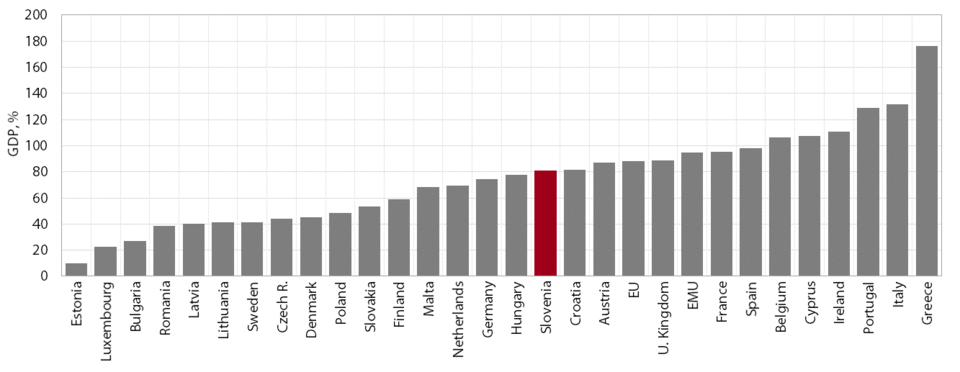
After the strong growth in 2013 owing to bank recapitalisations, public debt increased significantly again in 2014, which was also due to government borrowing for pre-financing borrowing needs after 2014. In 2014, the general government debt expanded by EUR 4.7 bn, reaching 80.9% of GDP, after it had already risen by EUR 6.1 bn in 2013, the most so far. A portion of the increase was used to cover the deficit (EUR 1.8 bn), while the rest (EUR 2.9 bn) was, in improved conditions on international financial markets (see Indicator 1.7), mainly intended for pre-financing borrowing requirements in the following years. Borrowing largely involved the issuance of long-term securities and loans (EUR 4.3 bn) and, partly, short-term domestic borrowing. The bulk of debt is from the central government (98%); the local government debt has doubled since the beginning of the crisis but remains low (2.1% of GDP). The increase in public debt in the last six years – by 59 percentage points as a share of GDP – was one of the largest in the EU (public debt rose more than in Slovenia only in Ireland, Cyprus and Greece). In a relatively short period it has taken Slovenia from the group of EU countries with low debt to the middle of EU countries in terms of the public debt to GDP ratio.
Consolidated general government debt in EU Member States, 2014
7 Yield on 10-year government bonds
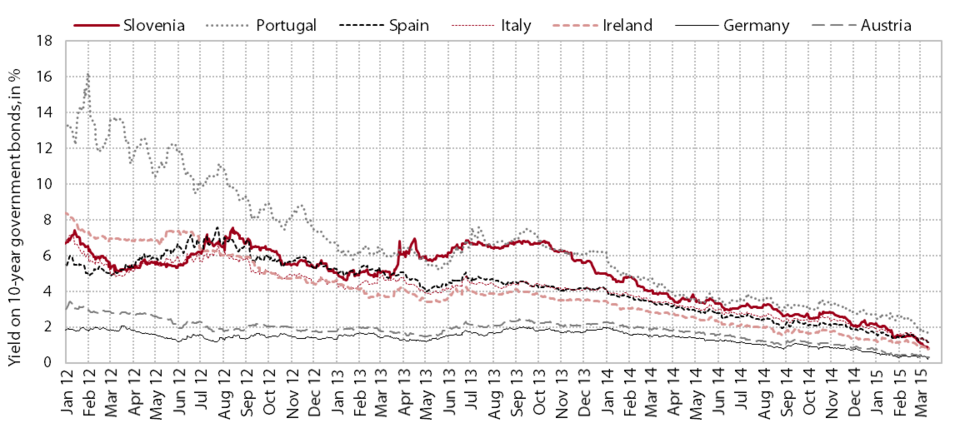
In 2014, the yields on Slovenian government bonds continued to decline under the impact of the government measures to stabilise the Slovenian financial sector, the ECB’s measures and a general improvement in the euro area and the Slovenian economy. After being relatively high in the first half of 2013, the yields on Slovenian government bonds declined notably at the end of 2013, after the announcement of the ECB’s measures, the release of the results of the banking system review and the stress tests, and the recapitalisation of the largest banks. They continued to fall in 2014 as the economic situation in Slovenia and in the euro area improved. By the end of June 2014, the yield on the 10-year government bond thus declined to around 3%. In the second half of the year, it fell further, to around 2%, the main reason being the new measures taken by the ECB to stabilise the situation, achieve price stability in the euro area and enhance the functioning of the transmission mechanism. Under the impact of these measures, government bond yields in the euro area declined not only in the countries with the highest ratings, but also in those most exposed, of which Ireland and Spain exited the financial aid mechanisms in December 2013, followed by Portugal in May 2014. At the beginning of 2015, government bond yields in the euro area declined further due to the announcement of the ECB’s additional non-standard measures (i.e. the quantitative easing). In some countries the yields on bonds with a shorter maturity (5 years) even fell into negative territory, while the yields on Slovenian 10-year euro bonds were the lowest since the adoption of the euro (below 1%).
Credit rating agencies upgraded the outlook for Slovenia in 2014; at the beginning of 2015, Moody’s restored the country’s credit rating to investment grade again. After the three major credit rating agencies lowered Slovenia’s credit rating in 2013, they left it unchanged in 2014 but raised the country’s outlook for the future. At the beginning of 2014, Moody’s thus improved the outlook for Slovenia to stable, followed by Fitch at the beginning of May; S&P also raised the outlook for Slovenia at the end of 2014, after changing it from stable to negative in the middle of the year due to heightened political risks regarding the implementation of economic and fiscal policy measures after the resignation of the government. At the beginning of 2015, Moody’s raised Slovenia’s credit rating by one notch, to investment grade.
Yield on 10-year government bonds denominated in euros
8 The economic structure of taxes and contributions
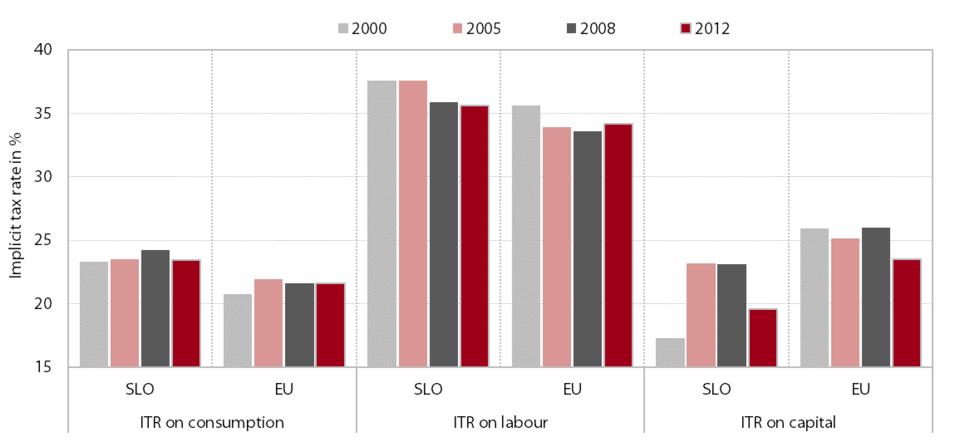
Since the onset of the economic crisis, taxes on consumption and labour as a share of total taxes and contributions have increased in Slovenia and are higher than on average in the EU, while the share of taxes on capital has decreased. The share of taxes on consumption in total taxes and contributions stood at 37.9% in Slovenia in 2012; this is 0.6 percentage points more than in 2011 and 3.3 percentage points above the EU average. The fall in the share of taxes on consumption seen in Slovenia since 2003 came to a halt in 2007, when the share started to rise gradually under the impact of growing private consumption (until 2011), an increase in excise duties and deterioration of companies’ business performance during the crisis. Its growth was more pronounced than on average in the EU, which is also expected for 2013 due to the effect of the VAT rate increase in Slovenia. The share of taxes on labour totalled 52.5% in Slovenia in 2012, which is 0.3 percentage points more than in 2011 and 5.3 percentage points more than the EU average. After declining in 2001–2007, the share of taxes on labour rose slightly during the crisis. The larger share than on average in the EU is explained by the larger share of social security contributions. After several years of decline, the share of taxes on capital totalled 9.8% in 2012, 0.8 percentage points less than in 2011. It slipped even further away (by 8.5 percentage points) from the EU average, which had declined significantly less during the crisis. The fall in the share since 2007 is explained by companies’ deteriorating business results during the crisis, the lowering of the tax rate on corporate income and the increase in tax relief for investments in 2012.
Since 2008, the implicit tax rate on capital has thus declined substantially; the rate on labour has also decreased slightly, while the rate on consumption is higher than at the onset of the crisis. According to SURS data, the implicit tax rate on capital in 2013 was lower than in 2012 and considerably lower than in 2007, when it was the highest. After increasing in 2011 and 2012, the tax burden on labour fell again in 2013, to the lowest level since it started to be calculated in 2000. After the increase in VAT rates in 2013 and a decline in household consumption, the implicit tax rate on consumption rose noticeably and exceeded that of 2008. The latest internationally comparable data show that in 2012, consumption and labour were more heavily taxed in Slovenia than on average in the EU, while the tax burden on capital was lower.
Implicit tax rates on consumption, labour and capital (as a % of the base)
9 Taxes and social security contributions
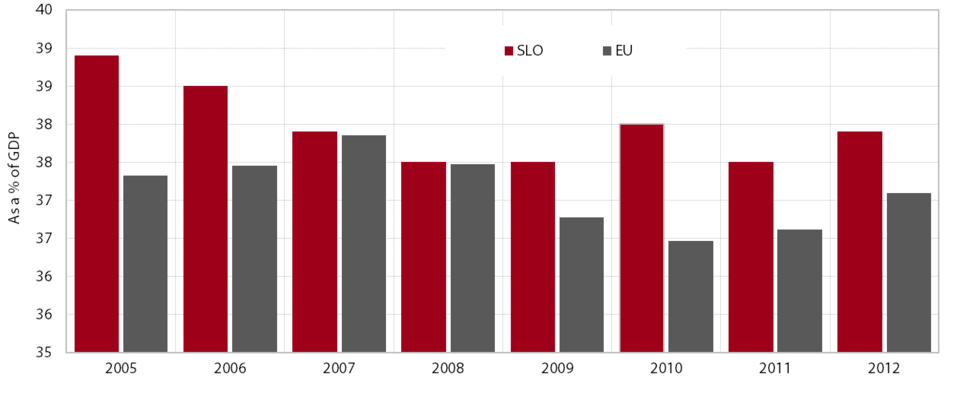
Taxes and social contributions rose in 2013 but have yet to achieve the nominal level of 2008. After a longer period of increase, taxes and social contributions declined significantly (-5.2%) in 2009 amid a 4.7% decline in nominal GDP. Their growth in 2010 and 2011, which accompanied the otherwise modest recovery of economic activity, was cancelled out after the renewed drop in GDP in 2012. The level of taxes and social contributions remained lower than in 2008 until and including 2013 (-3.8%). Their year-on-year increase in 2013 (by 0.8%) stemmed from higher taxes, while social security contributions declined for the second consecutive year. Taxes on products rose the most, as a result of the increase in VAT rates (in the middle of 2013) and the introduction of the tax on financial services (as of March 2013), while growth in other taxes on production was mainly due to an increase in concession fees. Taxes on capital were also higher than a year earlier, due to the new tax on the total assets of banks, while current taxes on income continued to decline (particularly the personal income tax and, to a lesser extent, the corporate income tax). According to preliminary data for 2014, growth in revenues from taxes (particularly taxes on production and, to some extent, current taxes on income and wealth, which had been declining in 2009–2013) strengthened under the impact of public finance measures and economic recovery; revenue from social security contributions was also up after two years of decline.
The share of taxes and social contributions in GDP rose slightly during the economic crisis and was just above the EU average in 2012. In the period of economic expansion (2005–2008), the share of taxes and social contributions relative to GDP had been decreasing, but started to rise again with the onset of the economic crisis. In 2013, it was 37.3%, which is 0.1 percentage points more than in 2012 and 0.4 percentage points more than in 2008. In the last year for which internationally comparable data are available (2012), the share of taxes and social contributions in Slovenia was just above the unweighted average of the EU, largely due to the relatively high social contributions of employees.
Taxes and social security contributions, Slovenia (ESA 1995)
10 General government expenditure by function
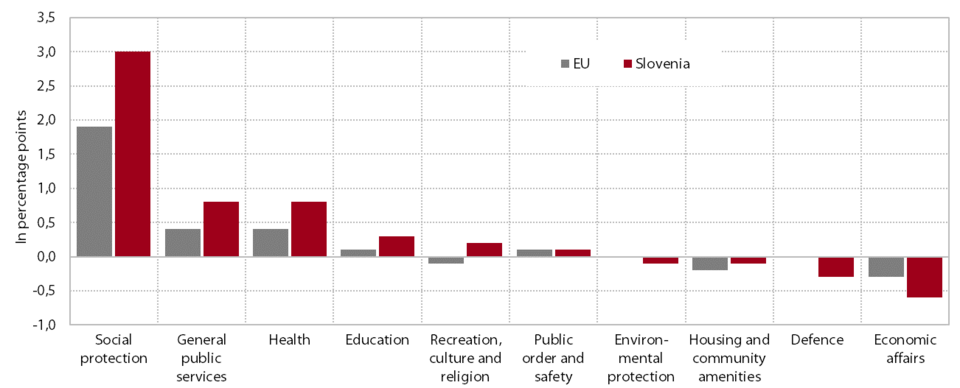
In 2013, general government expenditure by function increased across several categories, because of bank recapitalisations particularly for economic affairs, after only expenditure on housing and community amenities was up in 2012. In 2013, the largest share of general government expenditure went for economic affairs, the bulk being allocated for bank recapitalisations (10.1% of GDP). Expenditure on this function also rose if expenditure on recapitalisations is not taken into account, which is mainly related to increased investment after three years of decline. The increase in interest payments in 2013 (by EUR 224 m) was reflected in higher expenditure on general public services, while expenditure on public order and safety rose due to the payment of compensation to persons erased from the permanent residence register of the Republic of Slovenia, which is included in expenditure on this function. These three expenditure categories increased the most in 2013, partly under the impact of one-off factors. After a temporary decline in 2012 due to legislative changes in the area of social rights, expenditure on social protection also rose again in 2013. Excluding expenditure on bank recapitalisations, this expenditure category increased the most since the beginning of the economic crisis (3.1 percentage points of GDP in the period 2008–2013), followed by expenditure on general public services (which rose due to higher interest payments) and expenditure on health (where the increase was mainly due to higher compensation of employees). In 2008–2012, expenditures on these three functions (social protection, general public services and health) also rose the most in the EU as a whole, but in Slovenia they increased more, which is partly related to a relatively larger fall in GDP.
Change in the share of general government expenditure by function relative to GDP, 2008–2012
11 State aid
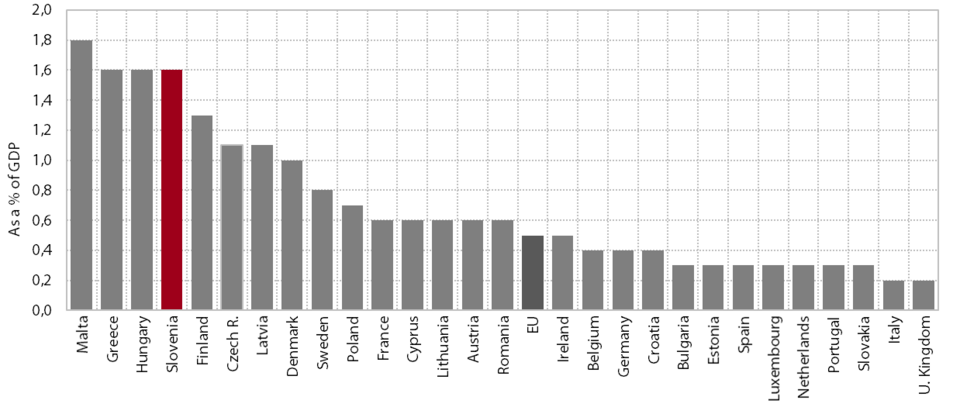
Since 2010, the volume of state aid (excluding aid to farmers) has again been growing rapidly, not only due to the banks’ balance sheets repair but also owing to the extremely high growth rates of state aid for employment and environmental protection. In 2013, state aid (excluding aid to farmers) totalled EUR 3,948 m (2012: EUR 986.2 m), of which EUR 3,317 m (in 2012: EUR 483 m) was allocated for the stabilisation of the banking sector (under a special scheme termed aid to remedy a serious disturbance in the economy or crisis aid). State aid excluding that for the banking sector also recorded rapid growth, reaching EUR 632 m in 2013 (2011: EUR 439 m; 2012: EUR 503 m), which is already much more than in 2009, when Slovenia adopted special anti-crisis measures focused on the business sector (Evidence on State Aid, Ministry of Finance, 2014). In 2010, these measures were removed, but as new measures were put in place instead, the level of state aid remained almost unchanged. In the following years, state aid started to rise sharply again owing to measures in the area of environmental safety and employment. Aid for employment started to rise in 2012, mainly owing to aid to promote the recruitment of disabled workers (in the form of grants, EUR 11 m, and reduced social security contributions, EUR 50 m). In environmental protection, aid for the promotion of energy from renewable energy sources (photovoltaic, hydroelectric and biogas power plants) rose by EUR 26 m in 2013, and a new measure – emissions trading – was introduced, one that is problematic from the environmental aspect, as it reduced the tax burden on the largest CO2 emitters. In terms of enhancing the competitiveness of the economy, the structure of state aid remained unfavourable in 2013, given that the aid categories meant to improve competitiveness (such as aid for R&D and training, aid for small and medium-sized enterprises, and, partly, regional aid), were as much as 40% lower than in 2011. State aid in Slovenia is very high in comparison to the EU. Increasing state aid is not in line with the Commission’s orientations as regards competitiveness.
As a result of bank recapitalisations in 2013, Slovenia joined the group of countries with above-average levels of state aid related to the financial crisis. Prior to 2013, financial crisis state aid was lower in Slovenia than on average in the EU, but with the banks' balance sheet repair in 2013 Slovenia moved to fifth place in terms of the level of such aid in 2008–2013. The European Commission estimates that Slovenia allocated 8.9% of GDP for state aid in this period, with only Ireland, Greece, Cyprus and Belgium having spent more on the recovery of banks (State Aid Scoreboard, 2014).
State aid (excluding crisis aid and aid for rail transport), 2013, as a % of GDP
12 General government subsidies
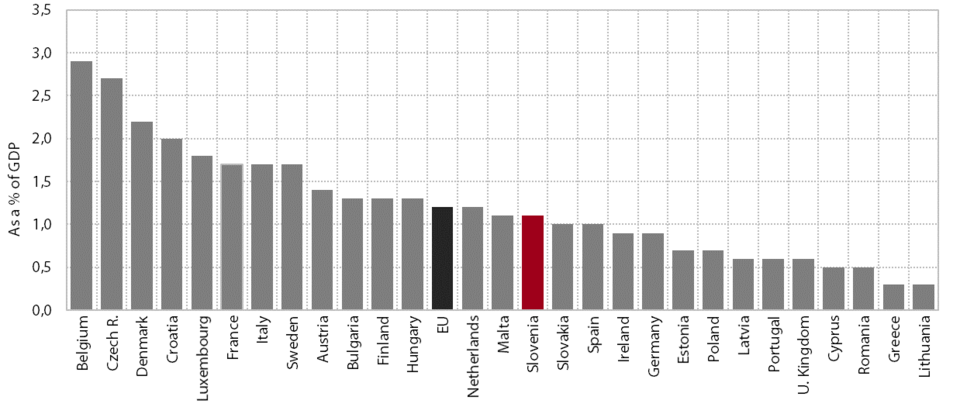
In 2014, general government subsidies reached the lowest level since the beginning of the economic crisis, but other forms of government aid have increased in this period. With the adoption of special anti-crisis measures in 2009 (which were similar in nature to subsidies) and amid a steep fall in GDP, the share of general government subsidies in GDP rose to 1.8% of GDP, recording the largest level since 2000. In 2010–2014, subsidies were for the most part declining (except in 2013), which was attributable to the expiry of anti-crisis measures, institutional changes in transport and austerity measures. In 2014, they were the lowest since 2008, while other forms of government aid picked up (state aid; see Indicator 1.11). In recent years, the share of general government subsidies in GDP has thus been comparable to the EU average, or even slightly lower.
The bulk of subsidies were allocated for economic affairs, of which in 2013 the functions of transport, agriculture, general economic and labour affairs were subsidised the most. In 2013, Slovenia earmarked 60% of general government subsidies for economic affairs (EUR 230.1 m); relative to 2012, they increased by EUR 37 m. Despite the strong fall in 2011 due to the institutional change in the railway system, and a further decline in 2013, subsidies for transport were still the highest among all functions. The second most important function is general economic, commercial and labour affairs. Aimed at alleviating the impact of the economic crisis, the relatively low subsidies for this purpose increased strongly and more than tripled in 2009 and 2010 as a result of measures to preserve jobs. Although the number of unemployed continued to increase, subsidies for this function shrank to the pre-crisis level in 2011 and 2012, before returning to the 2008 level in 2013. Subsidies for agriculture, having accounted for around 30% of all subsidies for economic affairs in 2005–2008, had been rapidly falling since 2008; in 2013, they surged (by EUR 47.4 m) and represented a large share of all general government subsidies again. Subsidies for other, non-economic, affairs, which fluctuate appreciably from year to year, rose by almost EUR 15 m in 2013 (to EUR 150.4 m). They were mainly allocated for lowering unemployment, waste and wastewater management, the protection of biodiversity and recreation, culture and religion.
General government subsidies, 2013, as a % of GDP
13 Development of the financial system
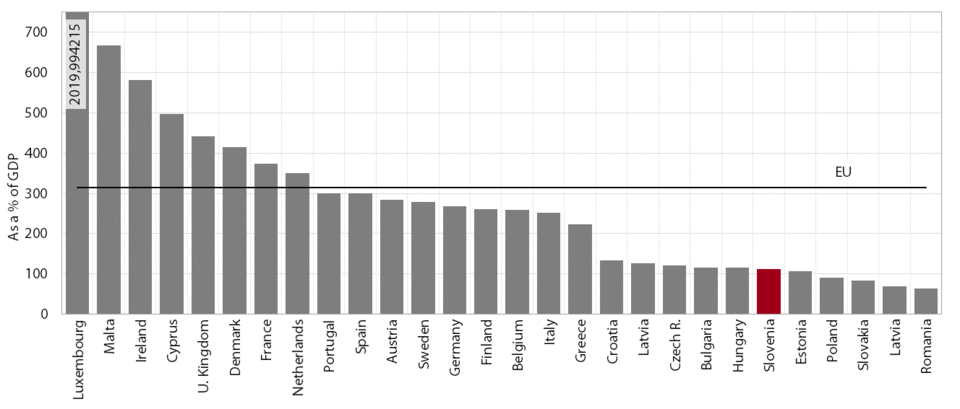
The gap in the level of development of the financial system relative to the EU average has been widening further since the onset of the financial crisis. The contraction of the banking system’s balance sheet continues even after the beginning of its stabilisation. On the assets side, this is partly explained by the lower lending activity due to the deleveraging of the economy and the transfer of a portion of claims to the BAMC, while on the liabilities side, banks are increasingly reducing their liabilities to the ECB and, albeit to a lesser extent than in previous years, foreign banks. The total assets of the Slovenian banking system declined by an additional 6.5% in 2014, to EUR 37.8 bn at the end of the year (101.5% of GDP, which is the least since 2005 and around 30% of the EU average in 2013). The smallest development gap is recorded in the area of insurance, where the indicator value had even been slightly rising during the crisis and reached around 65% of the EU average. The increase in the indicator value at the beginning of the crisis was mainly attributable to the lower GDP, as growth in insurance premiums first slowed significantly, while in the last few years insurance premiums have been falling gradually. Slovenia still lags significantly behind the EU in the share of life-insurance premiums, which, at 1.5% of GDP, reaches less than 30% of the EU average. Market capitalisation of shares as a % of GDP rose in 2014 (to 16.7%, which is approximately 40 percentage points lower than the 2007 high), but the gap with the EU average remained significant (the indicator value totalled 25% of that in the EU). The increase is mainly explained by the restart of privatisation, but it was also due to better business results of companies owing to more favourable economic trends. In 2014, market capitalisation of shares thus rose by 20.1% and the LJSE main index SBITOP by 19.6%.
Total assets as a % of GDP in EU Member States, in 2013
14 Loan-to-deposit ratio
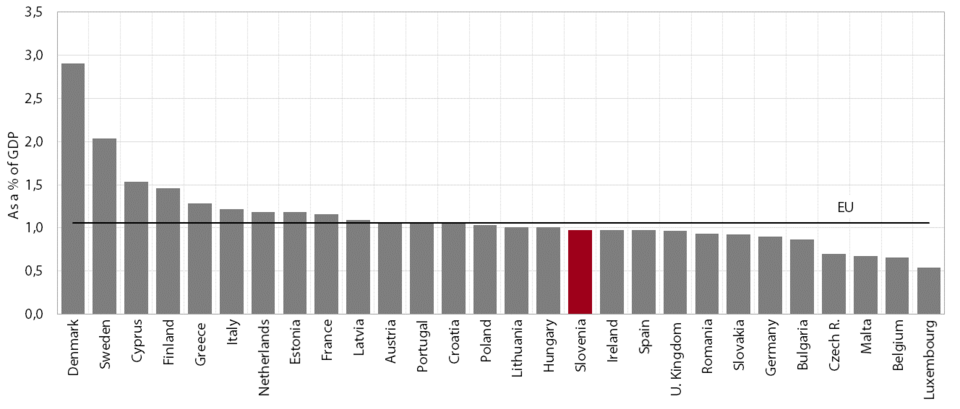
The loan-to-deposit ratio in the Slovenian banking system continued to decline rapidly in 2014. Last year’s decline of 24 basis points to 0.98 was the largest since the start of the international financial crisis; in 2008, the indicator value totalled 1.6. Deposits by the non-banking sector exceeded loans to this sector for the first time in ten years. This is largely due to a further decline in loans to the non-banking sector (by EUR 3.5 bn) as a result of debt repayments by the corporate sector and the repair of banks’ balance sheets, and, consequently, the transfers of their non-performing claims to the BAMC (in 2014, in the amount of EUR 1.6 bn). The lending activity of banks remains modest and, in our estimation, largely based on refinancing liabilities of over-indebted enterprises, thereby slightly alleviating the liquidity pressure related to maturing financial liabilities. The unfavourable conditions on the credit market are also reflected in interest rates on loans; they fell slightly at the end of the year but are still among the highest in the euro area. A significant factor in the decline in the loan-to-deposit ratio was growth in non-banking sector deposits, which were up EUR 2.1 bn. The beginning of banking system stabilisation has also increased confidence in the Slovenian banking system, which was reflected in higher deposits by the corporate sector (up EUR 1.5 bn) and households (up EUR 800 m in 2014). On the other hand, government deposits declined owing to the contraction of deposits from abroad.
After being significantly higher than in the EU before the crisis, the indicator value in Slovenia has declined considerably more than in the EU as a whole in recent years; last year, it was even below the EU average, for the first time on record. In the EU, the indicator has also been dropping in the past few years, but from a significantly lower pre-crisis level and very gradually, primarily owing to growth in deposits. At the end of 2014, the loan-to-deposit ratio in the EU was thus already higher than in Slovenia, at 1.06. During the crisis, the loan-to-deposit ratio declined more than in Slovenia only in Ireland and the Baltic states. In contrast, it rose more notably in Greece and Cyprus, reflecting the low confidence of savers in their banking systems, as between the end of 2008 and the end of 2014 the volume of deposits in these two countries contracted by 26.6% and 15.4%, respectively, while the volume of loans to non-banking sectors rose.
Loan-to-deposit ratio in EU Member States, in 2014
15 Non-performing claims
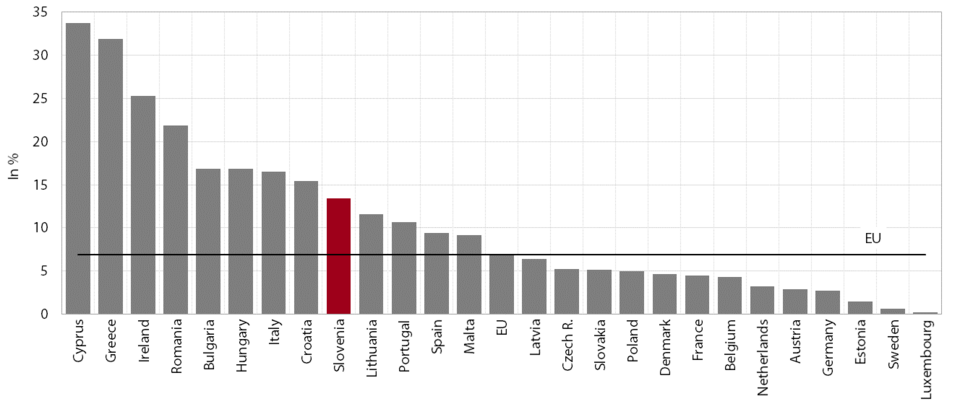
In 2014, the share of non-performing claims in the Slovenian banking system decreased. It amounted to EUR 4.4 bn, which is EUR 1.1 bn less than in 2013. It reached 11.9% of the banking system’s total exposure and was 5 percentage points higher than the EU average. This year’s movement of non-performing claims has been strongly impacted by the transfer of the claims of two banks to the BAMC (in the total amount of EUR 1.6 bn), but we estimate that it has also started to decline as a result of better economic conditions. In 2014, only the volume of non-performing claims against foreigners was up (by around EUR 120 m), but these claims also started to drop in the final quarter. We estimate that the decline in the share of non-performing claims was also slowed by a further decline in the comparable base because of a significant contraction in bank lending activity (excluding the transfers to the BAMC, 6.7%, which is similar to 2013). The inflow of new, higher-quality claims is thus decreasing, but it is precisely these claims that also record relatively high outflows, which are a consequence of both regular repayments and the transfer of claims among lower-quality claims due to lower credit ratings of customers. Data thus show a further reduction particularly in the highest-quality claims (rated A and B), which dropped by 5.5% in 2014 alone (until September) and account for only 79.2% of the banking system’s total exposure.
Among EU countries, in 2013 unfavourable developments continued particularly in those that were most affected by the financial crisis; in others the share of non-performing claims has already started to increase more slowly or is even declining. Outstanding increases (between 9 and 15 percentage points) were recorded particularly by Greece and Cyprus, which had started to stabilise their banking systems earlier than Slovenia. After Ireland entered into the financial assistance programme at the end of 2010 and started to repair its bank balance sheets, the share of non-performing claims in its banking system also more than doubled by the end of 2013, exceeding 25%. The slow decline in the share of non-performing claims in these countries shows that repairing bank balance sheets is a lengthy process, one that does not necessarily lead to an immediate decline in non-performing claims. The share of non-performing claims continues to decline in the Baltic states. In 2013, it also started to shrink in Germany, Poland, the Czech Republic, Slovakia, Denmark and Sweden.
Comparison of the shares of non-performing claims in EU Member States in 2013
16 Indebtedness of the corporate sector
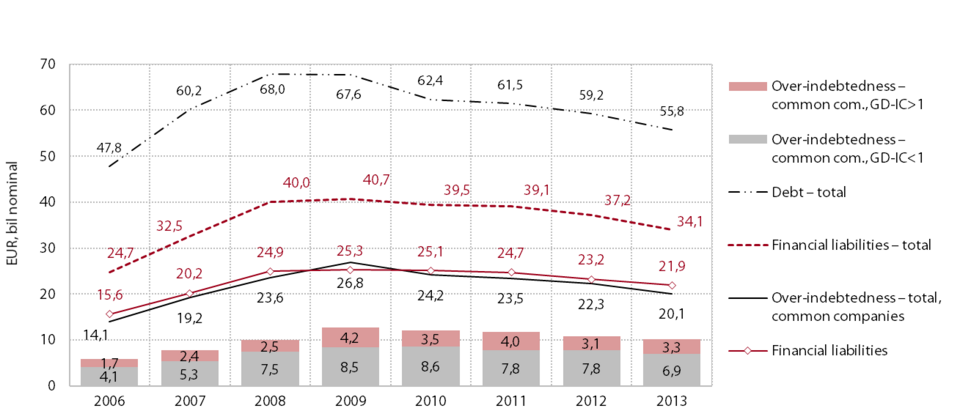
In the pre-crisis period, the overall and financial debt of companies were rapidly rising, but since 2009 companies have been gradually deleveraging; in 2013, they reached the indebtedness level of 2007. In 2008, overall and financial debt of the corporate sector grew by 42% and 62%, respectively, compared with 2006. With gradual deleveraging as a result of several factors, they dropped to approximately the level of 2007 over the next few years. Deleveraging in the first years of the crisis was at first largely the result of the winding-down of companies, while since 2012 it was also due to actual debt repayments. The over-indebtedness of Slovenian companies peaked in 2009, when it was nearly twice as much as in 2006, before it started to fall gradually and totalled EUR 20 bn in 2013. In the entire period, the over-indebtedness of common companies was approximately half lower than the over-indebtedness of all companies together (EUR 10.2 bn in 2013). Debt with interest coverage (EBITDA/interest) less than 1 (indicating that a company is unable to finance debt with its current operations) accounted for approximately a third of the debt of over-indebted common companies, but since 2009 it has decreased by EUR 0.9 bn to EUR 3.3 bn. In 2013, as much as 70% (EUR 2.3 bn) of this debt related to debt where the companies also had a negative EBITDA. The concentration of the financial debt of over-indebted common companies is relatively high, as in 2013 ten of the most indebted companies accounted for almost a quarter (EUR 3.7 bn) of the financial debt and a fifth (EUR 5 bn) of the total debt of over-indebted companies. Thirty of the most indebted companies, which employ 7% of all employed persons and generate 4% of value added, accounted for as much as a quarter (EUR 5.3 bn) of the financial and a third (EUR 7.1 bn) of the total debt. Seventeen out of the thirty most indebted companies had been over-indebted even before the crisis, while 13% of them also have low interest coverage (IC< 1). Ten companies were among the thirty most indebted companies in the entire period under consideration.
Indebtedness and over-indebtedness of the corporate sector
1 Gross domestic product per capita
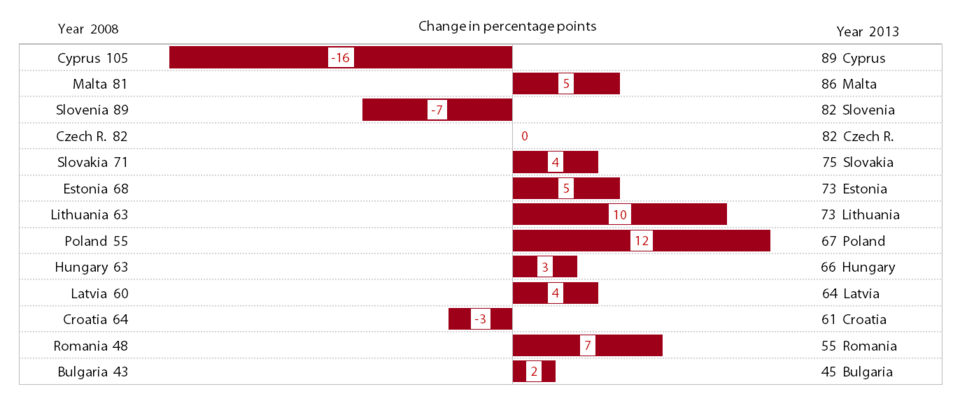
In 2013, GDP per capita in purchasing power standards remained at the lowest level since the beginning of the crisis, but the first data for 2014 suggest a departure from the negative trends. According to the most recent Eurostat figures, GDP per capita in purchasing power standards totalled 21,800 in 2013. Before the crisis, Slovenia had been converging to the EU on this indicator, reaching 89% of the EU average in 2008. However, owing to a steeper decline in economic activity, it lost 7 percentage points in comparison with the EU over the next four years, and stayed at that level in 2013. An interruption of the negative trends is indicated by data for 2014, when economic growth was slightly higher than in the EU for the first time since the beginning of the crisis.
Slovenia is in the group of EU countries whose relative positions in economic development have deteriorated the most since the beginning of the crisis. The countries that have diverged more from the EU average since 2008 than Slovenia (7 percentage points) are Greece (20 percentage points), Cyprus (16 percentage points), Spain and the Netherlands (8 percentage points each). In 2008, the countries closest to Slovenia in terms of GDP per capita in PPS were Greece and the Czech Republic, and in 2013, the Czech Republic, Portugal and Malta. At the same time, some new Member States substantially narrowed their gaps in comparison with Slovenia. Lithuania and Estonia, which had recorded half lower economic growth than Slovenia in 1999, were only 9 percentage points behind Slovenia in 2013. Among the new Member States, apart from the Czech Republic, which in 2013 reached the same development level relative to the EU as Slovenia, Slovakia approached Slovenia the most (lagging 7 percentage points more behind the EU average than Slovenia). In 2013, 11 countries narrowed their development gaps with the EU in comparison with the preceding year, most notably Latvia and Lithuania (4 percentage points each), seven countries maintained their positions, like Slovenia, while for 10 it deteriorated, most notably Luxemburg (7 percentage points), which nevertheless still exceeds the EU average by 157%, and Cyprus (4 percentage points). The gap in GDP per capita in PPS between EU Member States – which was widest at the beginning of the previous decade at 1:9.8 (Romania/Luxembourg) – has been narrowing over the years and stood at 1:5.8 in 2013 (Bulgaria/Luxembourg).
Change in GDP per capita in PPS relative to the EU average in 2008–2013, new EU Member States
2 Labour productivity
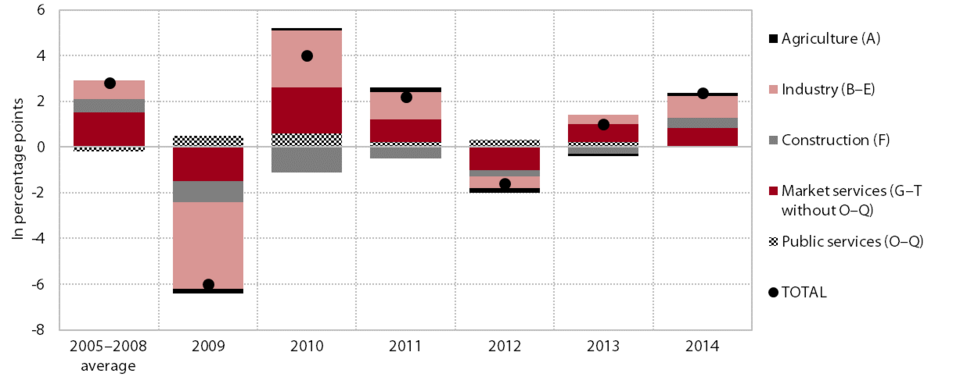
Amid a significant decline in employment since the onset of the crisis, labour productivity reached its 2008 level in 2014. As a result of a sharp fall in economic activity, it declined by as much as 6.1% at the beginning of the crisis in 2009. Labour productivity growth in subsequent years (except in 2012) mainly stemmed from the adjustment of employment to lower economic activity. In the absence of economic recovery, it was thus much more modest than before the crisis and insufficient for a faster convergence to the pre-crisis level. It was only in 2014, when employment also rose for the first time since the beginning of the crisis, that the main factor of productivity growth became the increase in GDP. Productivity growth also picked up slightly last year, but remained significantly below the long-term average prior to the crisis (the ten-year average before the crisis is 3.8%). Modest productivity growth since the beginning of the crisis, amid weak intra-industry productivity in most industries, was also due to the contraction in some parts of the economy that were most affected by the crisis, particularly construction and manufacturing (since 2009, these industries have been marked by significant negative contributions of the inter-industry component to productivity growth). Owing to stronger intra-industry growth, manufacturing activities have nevertheless been a major factor in the recovery of productivity since 2009 (see Figure). Alongside manufacturing, market services also made a substantial contribution to productivity growth in this period, particularly knowledge-intensive services and transportation. In 2014, the improvement was also notably impacted by the construction sector, which up to 2013 had been dragging down productivity growth in the entire economy.
The productivity gap between Slovenia and the EU average is narrowing slowly. Before the crisis, the level of productivity (expressed in purchasing power standards) in Slovenia had been approaching the EU average and was at 83% of the EU average in 2008. With less favourable GDP movements than in the EU, Slovenia’s productivity gap widened by 4 percentage points in 2009 and 2010 combined. In the next three years, it narrowed somewhat again (to 19% in 2013), the renewed convergence to the EU average being mainly due to a larger decline in employment, as GDP growth was lower than in the EU. Amid higher GDP growth, Slovenia’s productivity gap narrowed further in 2014, according to our estimates, but remained slightly wider than at the onset of the crisis.
Sectoral contributions to labour productivity growth in Slovenia’s economy
3 Market share

In 2014, Slovenia’s export competitiveness continued to improve. In 2008–2012, Slovenia was in the group of EU countries with the most pronounced erosion of world merchandise market share (-22.2%, seventh place), which was partly a consequence of the regional and product structure of the country’s exports (see Development Report 2014). The decline on the markets of key trading partners was approximately half smaller, and on the EU market around two thirds smaller in this period. A positive turnaround occurred in 2013, and the available data for 2014 indicate a continuation of positive trends. In both years Slovenia was among the EU countries with above-average world market share growth. The cumulative fall in the world market share has thus declined by approximately a third since the beginning of the crisis; on the markets of its main trading partners, Slovenia has already reached the pre-crisis level, while it has exceeded it in the EU.
After 2012, Slovenia’s world market share has risen as a consequence of a general increase in market shares on the main regional and product markets. Market share growth was recorded in Germany, Italy, Austria, Croatia, France, Hungary, Poland, the United Kingdom, Russia, the US and Macedonia. In 2012, the market share outpaced the pre-crisis level only in Germany and Croatia. In 2013, it was also higher than before the crisis in Austria and Italy, and in 2014, also in the US. At the same time, growth was also recorded on most relatively less important EU markets. In terms of factor intensity, the market shares of all product groups except labour-intensive products expanded in 2013: resource-intensive products, low-, medium- and high-technology products. Among key SITC sections, market share growth was recorded by medical and pharmaceutical products, non-ferrous metals and manufactures of metals, power-generating machinery and machinery specialised for particular industries and oil, oil derivatives and electricity.
World market shares of EU Member States, growth rates in %
4 Unit labour costs
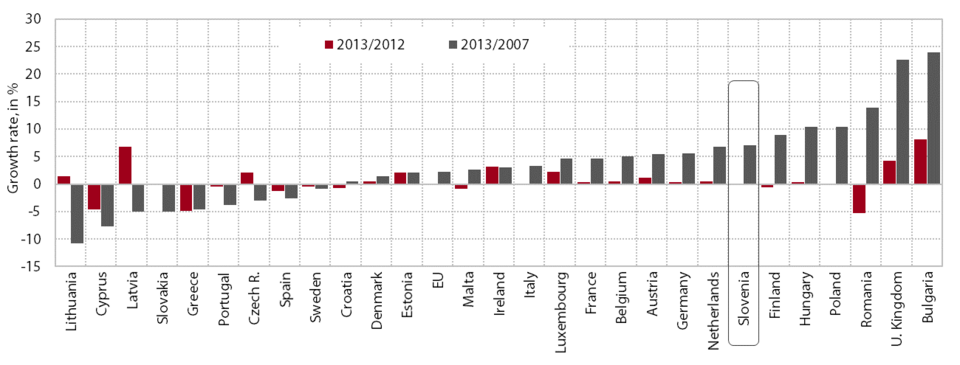
In 2014, unit labour costs declined again. After increasing for three consecutive years owing to rapid growth in wages (2008 and 2010 ) and a decline in labour productivity (2009), real unit labour costs dropped in 2011 for the first time since the beginning of the crisis as a result of the moderation of wage growth. When labour productivity declined again in 2012 due to lower economic activity, real unit labour costs increased again despite a concomitant decline in wages. With renewed labour productivity growth (as a result of a decline in employment), their growth came to a halt in 2013. In 2014, they decreased again according to preliminary data, mainly under the impact of more pronounced labour productivity growth boosted by growth in economic activity.
In manufacturing, unit labour costs came closer to the pre-crisis level than in the economy overall. In 2008–2009, strong contraction of foreign demand led to an above-average decline in value added and, consequently, labour productivity in manufacturing. Real growth in unit labour costs was therefore also higher, despite the more modest growth of wages. Real unit labour costs in manufacturing had already started to decline in 2010 and fell much more by 2014 than in the economy as a whole. Specifically, with a rebound in foreign demand, labour productivity in manufacturing was higher than in the economy as a whole due to a larger increase in value added and a steeper decline in employment. Compensation per employee was otherwise also up, particularly in 2010 (also under the impact of the increase in the minimum wage), but not by as much as labour productivity.
In 2014, Slovenia was in the group of EU countries with smaller cumulative losses in cost competitiveness in manufacturing since the beginning of the crisis, but the relative position of its economy was still much worse than before the crisis. Up to 2010, Slovenia was among EU Member States with above-average growth in real unit labour costs in manufacturing; since 2010 it has been in the group of those with above-average declines. In 2014, real unit labour costs were still 2% higher than in 2007 (in the EU 4.7% higher). In the economy as a whole, they were 4.3% higher in the same period (1.9%).
Real unit labour costs in Slovenia and EU Member States
5 Structure of merchandise exports by factor intensity
In 2013, the share of high-technology products in merchandise exports rose to the highest level thus far; the gap with the EU average narrowed. Having expanded at a subdued pace for several years, the share of high-technology products increased more notably only in the first years of the crisis (2008 and 2009), when other, less competitive, industries started to contract with the onset of the economic crisis. In the entire period since 2009, exports of high-technology products have been rising in absolute terms, more notably again in 2012 and 2013, and reached their largest share in the structure of merchandise exports so far. The gap with the EU average narrowed, but was still at 3.4 percentage points in 2013. Among high-technology products, exports of pharmaceutical products in particular have expanded in the entire period since 2008, their share in total exports being up 2.8 percentage points. The share of medium-technology products, which is significantly affected by declining exports of passenger cars, shrank in 2013 for the fourth year in a row (by 0.4 percentage points).
The significance of products with low value added in merchandise exports has been declining for several years primarily due to a decline in the share of labour-intensive products; furthermore, since the start of the crisis, the share of low-technology products has also fallen noticeably. The declining trend for labour-intensive products continued in 2013. Exports of these products have proved to be very sensitive to competition from countries with lower labour costs, and have been falling at an accelerated pace since Slovenia’s accession to the EU, owing chiefly to declining exports of textile products, furniture, paper and paperboard. From 2010 onwards, the decline in these sectors has also been impacted by a deterioration in cost competitiveness due to a substantial statutory increase in the minimum wage. The relative share of labour-intensive products has thus been approaching the EU average in recent years; in 2013, it was still 1.7 percentage points larger than in the EU, but – for the first time – slightly smaller than, on average, in new Member States.
The share of resource-intensive products continued to rise in 2013 mainly due to higher volumes of trade in primary products. The marked increase in the share of resource-intensive products after 2009 was a consequence of significantly higher shares of exports of electricity and oil derivatives, and mainly arose from increased volumes of trade in these product groups (re-exports). In 2013, the share of resource-intensive products climbed to the highest level on record, largely owing to higher volumes of trade in oil derivatives.
6 Knowledge-intensive market services
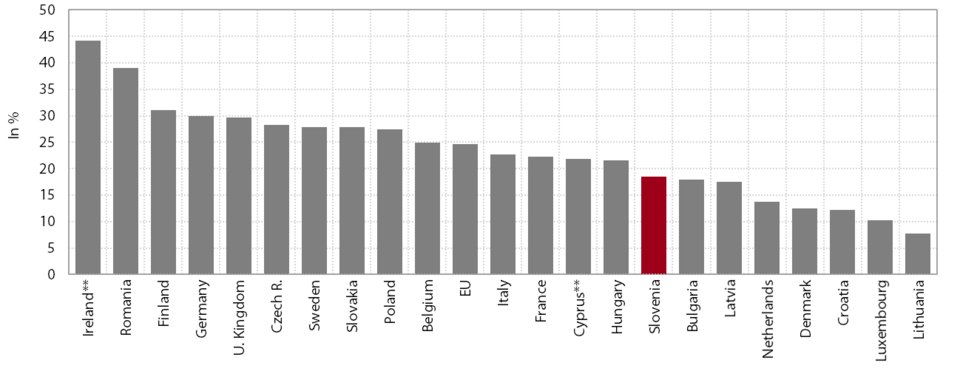
In 2013, knowledge-intensive market services continued to recover more slowly than in the EU, but as a result of greater reorientation to foreign markets, significant improvement started to be seen in some areas. The real value added of knowledge-intensive non-financial market services in the EU, which already surpassed the 2008 level in 2011, has continued to rise in subsequent years. In Slovenia, it has been hovering just below the pre-crisis level since 2009. The gap between Slovenia and the EU is largely attributable to architectural, technical, advertising, programming and broadcasting activities and telecommunications, which in the first years of the crisis were more focused on the domestic market and have only made forays into foreign markets in the recent period. The value added of these services was about 15% below the pre-crisis level in 2013, while in the EU it already exceeded the 2008 level in 2011. On the other hand, in 2013 the value added of computer programming and legal and accounting services, which since 2009 have been increasing sales revenues primarily on foreign markets, was 18.5% above the 2008 level in Slovenia, compared with just about 5% in the EU (data for 2012). In Slovenia, the 2008 level was also significantly exceeded in scientific research and development activities.
Despite the increase in sales revenues on foreign markets, the share of knowledge-intensive market services in total exports of services in Slovenia was much smaller than in the EU. In the EU-27 it averaged 21.9% in 2008 and increased further to 24.8% by 2012, while in Slovenia the corresponding share in 2012 (18.5%) was even smaller than before the crisis. Data for 2013 (which are fully available only for Slovenia) indicate slightly more favourable trends (increase in the share of knowledge-intensive services to 19.8% of total exports of services) and thus a narrowing of the gap with the EU. The smaller share of knowledge-intensive services in the structure of exports can otherwise be partly explained by a relatively large share of exports of travel and transport services related to Slovenia’s natural conditions and strategic position, but the declining share of knowledge-intensive services on foreign markets is also a sign of their low export competitiveness (see Section 2.1). A smaller share in services exports compared with the EU is recorded particularly by computer services (4.8 percentage points), as well as legal, accounting, tax consultancy services (3.3 percentage points) and research and development activities (2.2 percentage points). A growing and larger share in services exports than in the EU is recorded by telecommunications (3.1 percentage points).
Share of knowledge-intensive non-financial market services in total exports of services, 2012
7 Network industries
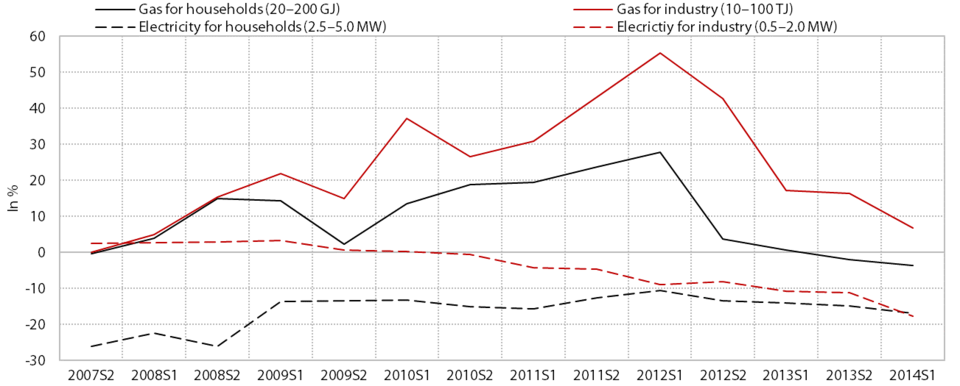
In electronic communications, competition in broadband internet is similar to that in the EU, but competition in fixed and mobile telephony remains lower than in the EU. The market share of the largest provider on the fixed telephony market has contracted significantly in recent years but still accounts for almost two thirds (in the EU, 50%). Stronger competition is attributable to the growing share of internet telephony (the entry of new providers). In recent years, fixed telephony has also been increasingly supplanted by mobile telephony. In this segment too, market concentration is still relatively high (the dominant operator still accounting for half of the market; a third in the EU). Broadband internet access is the most competitive market, with the market share of the leading provider already below the EU average. According to the most recent price data, which are available for 2010, service prices in fixed and mobile telephony were mostly lower than in the EU, but they dropped a few percentage points less than in the EU over the whole period of 2010-2014. The ownership structure in electronic communications remains roughly unchanged, characterised by a high share of state ownership in the biggest provider.
The electricity and gas market has been formally liberalised since 2007, and in the past few years, this has shown in increasing rates of provider switching. In electricity supply, the number of switches reached around 50,000 per year in the last three years (approximately 5% of all customers). On the electricity generation market, the competition rate was low in 2013 (HHI market concentration index of 4,721) but comparable with the EU. Competition on the retail market has been stronger. In the period from the liberalisation of the electricity market (2007) up to 2013, the HHI index dropped from 2,032 to 1,479. The structure of providers changed even more, the share of the three principal providers having fallen from 70% in 2007 to just above 40% in 2013. In the first half of 2014, the retail price of electricity for households and industry excluding tax was around 17% below the EU average, similar to the general price level in Slovenia. On the natural gas market, the arrival of a new provider led to sharp price falls in 2012, also relative to the EU. The gas price for households has thus already dropped below the EU average, while the price for industry has come fairly close to the average price in the EU. In early 2015, the Slovenian Competition Protection Agency required the main provider to abolish the remaining long-term contracts with its customers, which will lead to full liberalisation of the market and increase competition. While provider switching had been practically non-existent until 2011, the switching rate exceeded 5% of customers in subsequent years. Like electronic communications, electricity and gas supply is also characterised by a very high share of state ownership in the respective dominant providers.
Discrepancies in energy prices between Slovenia and the EU average
8 Foreign direct investment
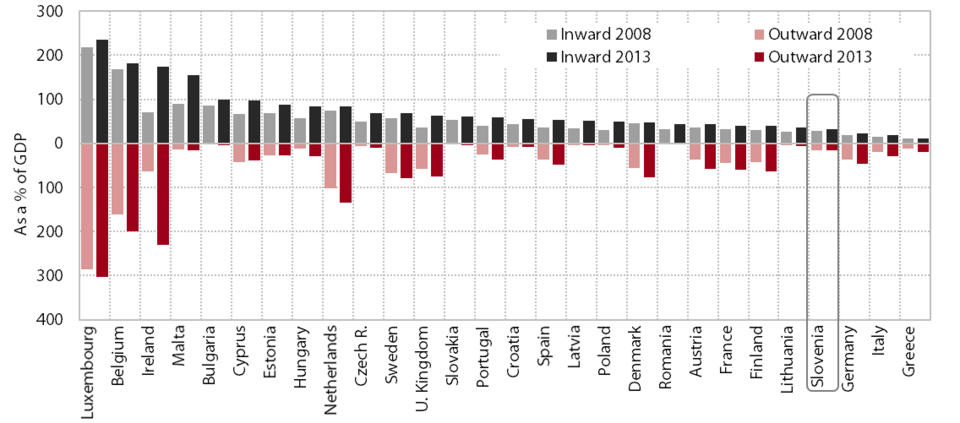
After relatively low inward FDI in the last few years, inflows indicate an improvement in 2014, while outward FDI trends remain unfavourable. After the increase in 2010–2012, the stock of inward FDI fell slightly again in Slovenia in 2013 (by 3.5%). Outward FDI stock, meanwhile, dropped even more (by 9.4%), for the fourth year in a row, and was 15.8% below its 2009 peak. Despite the decline in inward FDI stock in 2013, the inflows of equity capital were positive in 2013 and – with the exception of those in 2010 – the highest since the onset of the crisis. The decline in inward FDI stock in 2013 can thus be attributed to the negative flow of intra-company crediting of Slovenian subsidiaries by their foreign parent companies. Much more favourable trends were recorded in 2014, with equity capital inflows totalling EUR 1,373.6 m, almost 3.3 times the figure in 2013, which is primarily due to the renewal of the privatisation process and increased sales of equity stakes in Slovenian companies. Outward FDI recorded equity capital outflows from Slovenia in 2014, but they were much lower than in the preceding year. The decline in outward FDI stock can thus also be explained by a strong net outflow of intra-company crediting.
Slovenia remains among EU countries with the lowest inward FDI stock as a share of GDP. Since 2005 when it was 20.5%, the share of inward FDI in GDP did not increase much, standing at 24.7% at the end of 2013, compared with 22.7% in the pre-crisis year 2008. Slovenia otherwise remains among those EU countries with the lowest stock of inward FDI and the smallest increase in inward FDI stock as a share of GDP. A smaller share than Slovenia is recorded only by Greece, Italy and Germany. In terms of outward FDI stock relative to GDP, among the new Member States, Slovenia lags behind Cyprus, Hungary and Estonia.
Stock of inward and outward FDI, as a % of GDP
9 Entrepreneurial activity
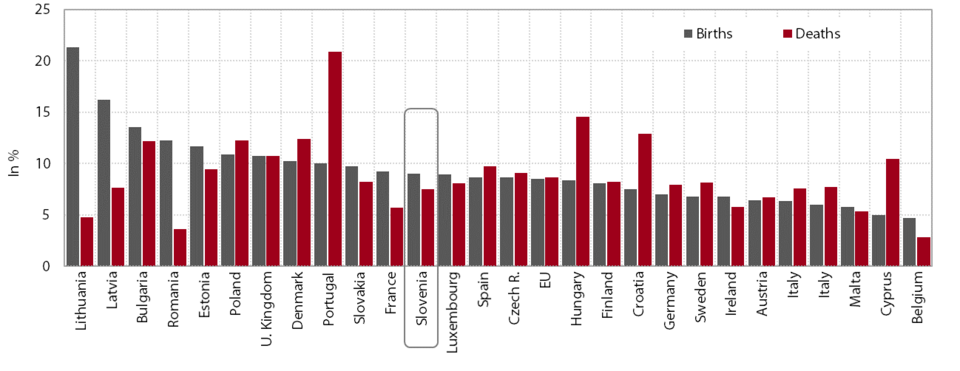
Early-stage entrepreneurial activity rebounded to the pre-crisis level but lags behind that in the EU. The rate of total early-stage entrepreneurial activity (TEA-index) according to the Global Entrepreneurship Monitor (GEM) data swung down only slightly in 2014, after increasing significantly for two years in a row. The share of nascent entrepreneurs (running businesses for less than three months) increased slightly again, while the share of new entrepreneurs (those who have been in business for less than three and a half years) declined. Necessity-driven entrepreneurial activity remained unchanged at a relatively high level from 2013, while opportunity-driven entrepreneurial activity decreased slightly and remained lower than before the crisis. Total entrepreneurial activity swung downwards as a result of a noticeable decline in established businesses, but remained similar to that in 2008. Early-stage entrepreneurial activity in the EU overall rose substantially owing to growth in both nascent and new entrepreneurs (to 7.1%) and was significantly higher than in 2008 when it stood at 5.3%. Consequently, Slovenia's gap with the EU average widened. Business demography in Slovenia shows positive entrepreneurial dynamics, the share of newly established enterprises without a predecessor exceeding the share of enterprises that went out of business and had no successor. In 2012, the last year for which data are available, 10.1% of all new enterprises were established in the total business economy, but their share had been gradually falling from 2009 to 2012. In contrast, the enterprise death rate was rising in the same period, enterprise deaths as a share of active enterprises reaching 8.3% in 2011. The share of enterprise births was slightly larger and the share of enterprise deaths slightly smaller than on average in the EU. Entrepreneurial dynamics were most favourable in knowledge-intensive services (births 2012: 11.2%; deaths 2012: 7.4%), which also recorded significant growth in the number of employees in high-growth enterprises in the last two years (in 2012: by 7.6%, in 2013 by 5.0%).
Business demography in the tradable sector*, 2012, as a % of all active enterprises
10 Population with tertiary education
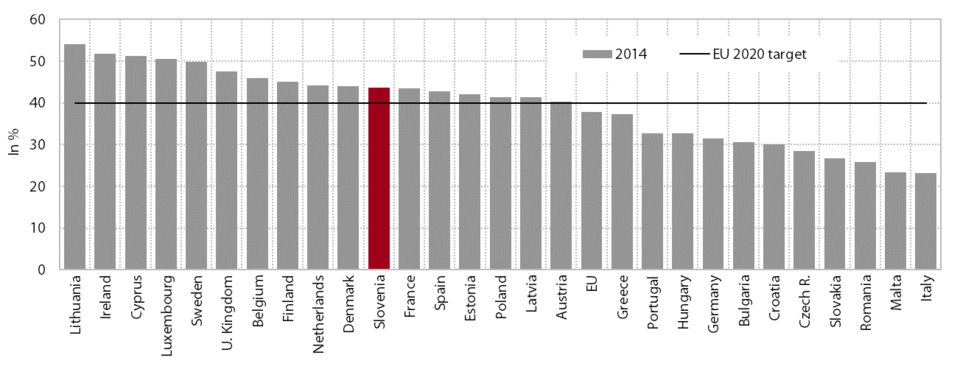
The share of adults with tertiary education reached the EU average for the first time in 2014. In the 2008–2014 period, the share of adults (aged 25–64 years) with tertiary education rose more than on average in the EU, which is related to the much higher participation of young people (20–24 years) in tertiary education than in the EU and a rapid increase in the number of graduates in this period. In 2013, the number of graduates otherwise fell for the first time, owing to declining enrolments as a consequence of demographic trends, which are also going to affect the number of graduates in the future.
In an international comparison, Slovenia stands out particularly by its large share of tertiary educated youth, which has been rapidly rising in the past few years. With a relatively high participation of young people in education, Slovenia has a large share of tertiary educated youth. However, this holds true only for the 30–34 age group where the share of the population with tertiary education is rising faster than in the EU. In 2014, it stood at 43.7%. It has been higher than the EU average (37.8) since 2010 and has also already surpassed the Europe 2020 Strategy target of 40.0%. As a result of the much higher participation of women in tertiary education, the share of tertiary educated women (56.3%) is much larger than the corresponding share of men (38.4%). Given the low efficiency of study in Slovenia, the share of the tertiary educated population in the 25–29 age group is smaller than in the EU (SLO: 32.4%; EU: 35.9%), and the gap widened further in 2014. The increase in the share of young people with tertiary education is favourable, as it strengthens the country’s human capital, but for enhancing competitiveness, the structure of tertiary educated people is insufficiently adjusted to labour market needs. Job prospects for young people with tertiary education deteriorated significantly during the crisis, which spurred their migration abroad, a trend that intensified in 2013.
Share of the population aged 30-34 with tertiary education, 2nd quarter, in %
11 Education expenditure
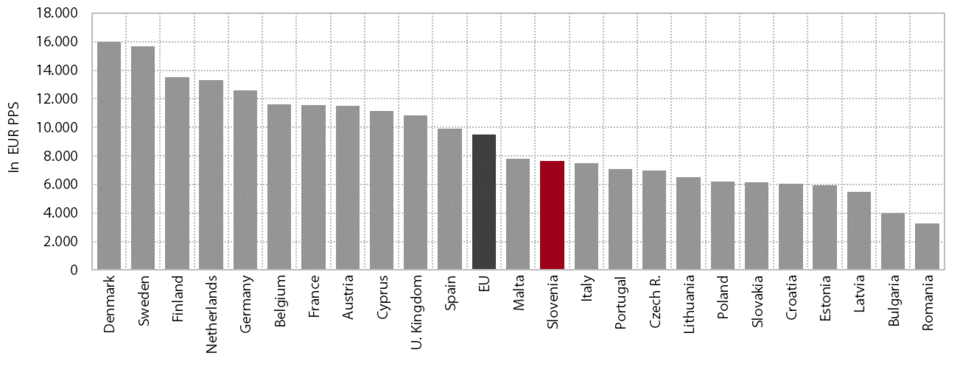
Public expenditure on education as a share of GDP remains high by international comparison, while the share of private expenditure is still low. Public spending on education accounted for 5.34% of GDP in 2012. Relative to the preceding year, it declined owing to a sharp decline in transfers to students at the levels of upper-secondary and tertiary education (as a consequence of changes in social legislation and austerity measures), the largest decline being in expenditure on tertiary education (as a % of GDP). The share of public funding for education in GDP in 2011 (the latest international data available) was otherwise higher than the EU average, but it had also increased more than in the EU in the 2008–2011 period. Public spending on education (as a % of GDP) exceeds the EU average at all levels except for the third triad of elementary education and for upper secondary education (Isced 2–4). Private expenditure as a % of GDP has been practically unchanged since 2009, and lower than in the EU overall. In 2012, it declined only at the tertiary level, where it is lower than on average in the EU.
Expenditure (both public and private) per participant in education is low due to the large number of people enrolled, but it is rising. In 2011, expenditure on educational institutions per participant increased at all levels but remained lower than on average in the EU. It was higher only at the primary level, which includes the first two triads of elementary school (grades 1–6). Expenditure at the tertiary level was much lower despite high public funding, which is attributable to the high participation of young people in tertiary education. However, given the decline in the generations of young people for enrolment, expenditure per participant in tertiary education otherwise increased the most in the 2008–2011 period.
Expenditure on educational institutions per participant at the tertiary level of education, in EUR PPS, 2011
12 Participation of adults in lifelong learning
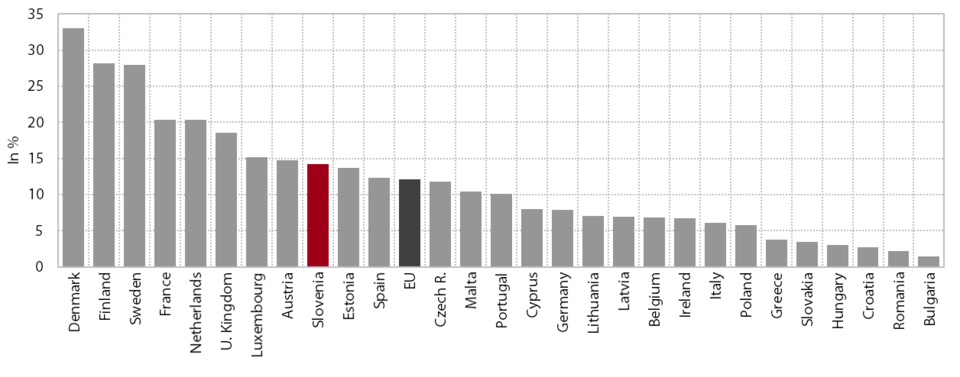
The participation of adults in lifelong learning exceeds the EU average, but is declining. In 2014, the participation of adults aged 25–64 in lifelong learning (formal and non-formal education) declined for the fourth consecutive year but was still higher than the EU average. Slovenia is thus moving away from the objective of the strategic framework for European cooperation in education and training (Education and Training 2020/ET 2020), which is 15%, and the objective of the Resolution on the Slovenian Master Plan for Adult Education 2013– 2020, which is 19%. Compared with the EU, the lower participation rates for older people (55–64 years) and less educated people stand out in particular. We estimate that the lower participation of adults in lifelong learning during the crisis is related to a decline in the financial means for education of both adults and employers, and cuts in public funds for adult education in recent years.
The participation of employed people in lifelong learning is also diminishing. The participation of employed persons aged 25–64 in lifelong learning is above the EU average, but it fell in 2008–2013 in Slovenia, while it increased in the EU. In 2013, it was higher than in the EU overall in all sectors but administrative and support service activities and construction. The lowest participation was recorded in construction and the highest in education, with considerable differences existing between sectors (see Chapter 2.2). Broken down by occupation, participation in lifelong learning is highest in the ISCO 1–3 group, which has the largest share of employed persons with tertiary education. In other occupational groups, where income tends to be lower and people are less able to afford education, participation is much lower owing to declining employer investment, despite government incentives. The difference in participation in lifelong learning between ISCO 1–3 and other occupational groups is higher than on average in the EU, although it declined in 2008–2013.
Participation of employed persons aged 25–64 in lifelong learning, 2013, in %
13 Gross domestic expenditure on research and development
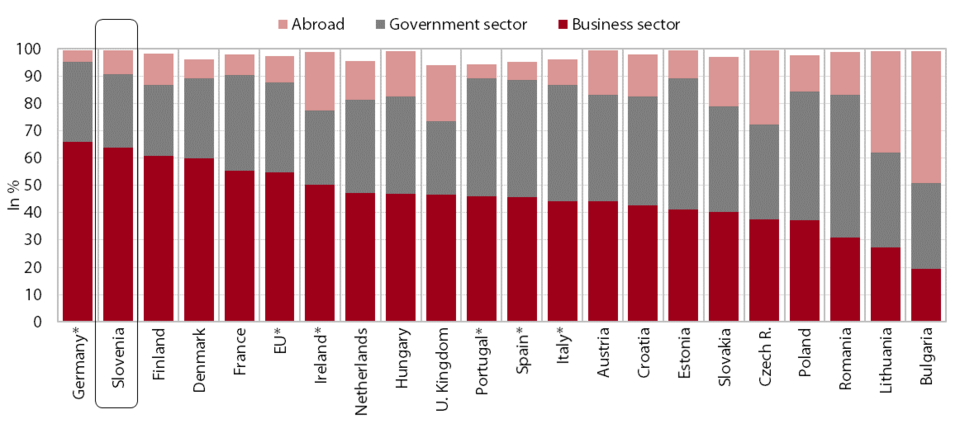
In 2013, the share of gross domestic expenditure on R&D (GERD) remained at the previous year’s level (2.59% of GDP) and was higher than the EU average for the fourth consecutive year. In 2013, the real growth rate of GERD was negative for the first time in the 2009–2013 period (-1.1%), but owing to a similar real fall in GDP, the share of GERD in GDP did not decline. During the crisis, investment in R&D rose considerably in real terms, by 31.5%, which is significantly more than in the EU overall (5.1%). The increase was mainly attributable to the business sector, which has increased investment in R&D by 44.8% in real terms since the beginning of the crisis, in part due to higher tax reliefs. In the five-year period (2009–2013) the business sector claimed EUR 627.0 m in tax reliefs for R&D, of which almost a third in 2013 alone. Since 2009, the business sector has been increasing its share in total funding for GERD. In 2013, this share was 63.8%, which was more than in all EU Member States except Germany. The share of researchers in the business sector in the total number of researchers is also rising along with its investments in R&D. In 2013, it reached the highest level thus far (53.6%) and was higher than the EU average for the third year in a row (2013: 48.2%). The government sector’s expenditure on GERD, which has been falling in real terms since 2012, declined by a further 7.3% in 2013, so that its share in total funding for GERD fell considerably, to 26.9% (2009: 35.7%). Funding from abroad for the implementation of R&D projects in Slovenia accounted for a significant portion of GERD, as it has risen in real terms during the crisis (in total, by as much as 94.1%). In 2013, funding from abroad increased only by 3.0% in real terms and represented 8.9% of total expenditure (2006: 6.0%). The majority of foreign funding for Slovenian R&D came from investment by the European Commission and the business sector abroad. All other Central and Eastern European countries have much larger shares of foreign funds in gross domestic expenditure on R&D, between 10% and 50%, the majority being European Commission funds.
Gross domestic expenditure on R&D by source of funding, in %, 2013*
14 Innovation-active enterprises
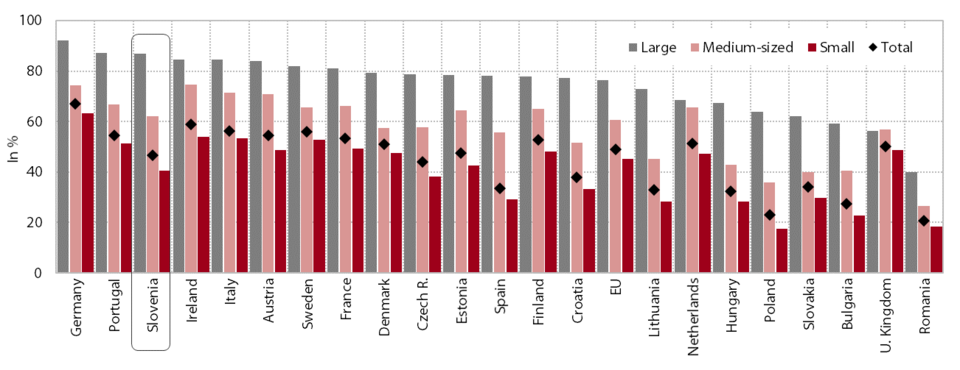
In 2010–2012, 46.5% of enterprises were innovation-active in Slovenia, which is slightly less than in the EU as a whole (48.9%). In manufacturing, this share is traditionally higher (49.9%), while in the service sectors it is usually lower (43.8%). As a result of a larger number of activities that are now included in the statistical survey on innovation activity, data are methodologically incomparable with those for the previous period of 2008 to 2010. Changes in innovation intensity can otherwise be inferred from data based on the previous methodology (SURS, 2014), which indicate that the share of innovation-active enterprises (IAE) declined in 2010–2012 by 3.5 percentage points relative to the 2008–2010 period. Eurostat figures for EU Member States for which comparable data are available also show a decline in the share of IAE in the majority of EU countries. Slovenia has a wider gap with the EU in innovation activity in service activities than in manufacturing, while the share of only non-technologically innovation-active enterprises remains higher than in the EU overall. Innovation intensity is highest in information and communication activities (Slovenia: 67.1%; Finland, Ireland, Austria, Portugal and Germany: over 70%). It is also conditional on the size of enterprises, being lowest in small enterprises in all countries. Slovenia has a 40.5% share of innovation-active small enterprises, compared with the EU average of 45.2%. In terms of innovation activity in medium-sized and large enterprises, Slovenia exceeds the EU by 1.5 or 10.5 percentage points, respectively. From the perspective of the effective functioning of the business ecosystem, there is still significant room for incentives to enhance innovation intensity particularly in small enterprises, most of which are engaged in service activities.
Share of innovation-active enterprises by size, 2010–2012, in % of the total number of enterprises
15 Science and technology graduates
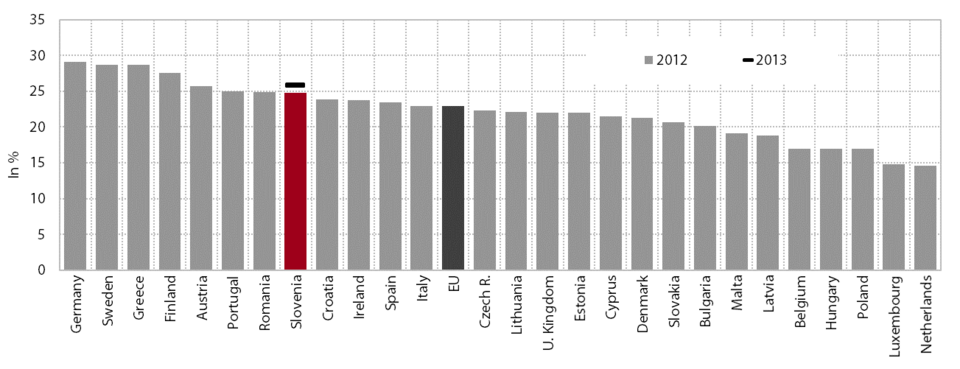
The share of science and technology graduates rose further in Slovenia in 2013 and exceeds the EU average, but their number is decreasing because of smaller generations of young people. The favourable trends in the share of science and technology graduates are related to the popularisation of this field, more scholarships and better employment prospects than for social science graduates. However, as in most other fields, the number of graduates in science and technology is declining because of demographic trends, i.e. the shrinking population of young people for enrolment in tertiary education. The number of these graduates per 1,000 population aged 20–29 also fell, although it was still above the EU average. With a decline in enrolment in the past few years, we expect the number of science and technology graduates to continue to fall in the coming years, which could increase the mismatch between the supply of and demand for these graduates on the labour market. Sponsorship scholarships are also failing to reduce the mismatch, given that the share of science and technology graduates with this type of scholarship is declining and many such scholarships go unawarded because students do not want to be tied to one employer.
The number of doctors of science and technology increased further in 2013. In 2008–2012 (the most recent international data), it was rising more slowly than on average in the EU. The increase in the number of doctors of science and technology is attributable to government incentives (Young Researchers, Young Researchers in the Economy), the favourable trends being also impacted by a concurrent completion of studies under the new Bologna and previous (pre-Bologna) programmes. The share of new doctorate holders in the field of science and technology in the total number of doctors of science otherwise varies across the years, also depending on incentives. While it was close to the EU average in 2012, it rose to 50.3% in 2013. However, with enrolment in doctoral studies falling since the academic year 2012/2013 owing to cuts in public funds for young researchers, these favourable movements are not expected to continue in the years to come.
Share of science and technology graduates in the total number of tertiary education graduates, 2012
16 Intellectual property
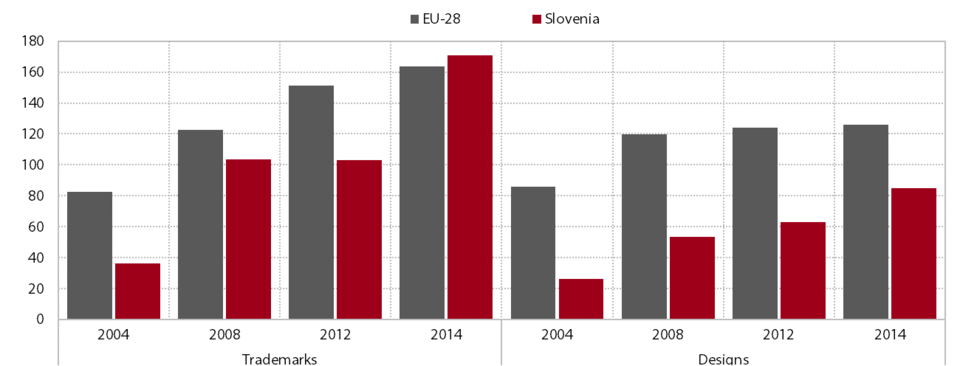
Slovenia’s gap with the EU average in terms of patent applications with the European Patent Office (EPO) remains wide; the gap in Community designs is narrowing, while the number of Community trademark applications exceeded the EU average in 2014. According to provisional data, Slovenian applicants filed 59.7 patent applications per million population with the EPO in 2014, which is an almost 10% decline over 2013, when the number of patent applications per million population recorded growth for the first time since the decline in 2009–2014. In 2014, Slovenia widened its gap with the EU average in the number of patent applications per million population again, but remained much more successful in the number of patent applications with the EPO than other Central and Eastern European countries. In 2009–2014, the number of patent applications per million population fell at a 0.3% average annual rate, while in most EU Member States the value of this indicator was rising. The number of Community trademark applications filed by Slovenian applicants with the OHIM increased to 170.8 per million population in 2014, which indicates a continuation of growth from the previous two years. In 2014, the number of Community trademark applications for the first time exceeded the EU average, which totalled 163.7 per million population. In 2014, Slovenian applicants registered 84.9 Community designs per million population with the OHIM, which also means a continuation of growth (2014; 14.3%; 2013: 18.4%). The value of this indicator was up 59.5% over 2008 in 2014, but still much lower than the EU average (126.0).
Figure: Number of Community trademarks applications and registered Community designs per million population
17 Use of internet and e-services
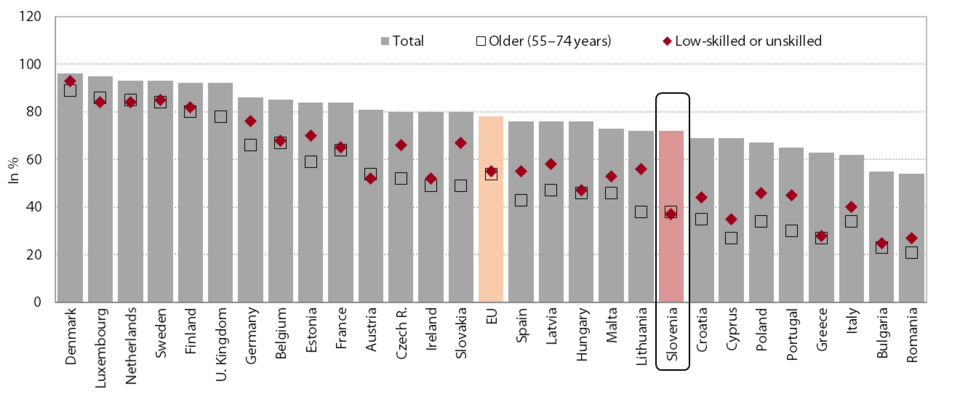
The prevalence of Internet usage has been lagging slightly behind the EU average in recent years. Since 2010, when the prevalence of Internet access and use was comparable with the EU average, Slovenia's gap with more advanced countries has been gradually increasing. In the first quarter of 2014, the share of Internet users (72%) was even somewhat smaller than a year earlier (in contrast to the EU where it rose further), while the share of households with Internet access (77%) was again increasing more slowly than in the EU. The underlying cause of these developments is, in part, the crisis, which made the Internet less accessible particularly to households in lower income brackets. The impact of the crisis is also reflected in a smaller share of Internet users among less educated people, which were more likely to lose jobs during the crisis. Both groups recorded a decline in the share of Internet users in 2014 and the widest gap with the EU since the onset of the crisis. Furthermore, Internet usage among older people (particularly in the age group of 55–64) is also much lower in Slovenia than in the EU. Last year’s gap in this area was also the widest thus far, the main reason being that older people lack appropriate skills. Although Slovenia does not diverge from the EU average in e-skills (basic skills for computer use, use of internet), it lags significantly behind in terms of e-competences of older people and those with a lower education.
Slovenia continues to lag behind the EU average in the use of some advanced e-services. Internet users in Slovenia use the Internet to nearly the same extent or more than in the EU not only for simple services such as seeking information, reading on-line news from various media or downloading official forms, but also for selling goods and services, making phone calls and publishing their own web content. However, Slovenia has a wide gap – which is not narrowing – in the use of some more sophisticated services, in particular e-banking, online shopping, online travel booking and downloading software. In the last two years, greater progress was made only as regards submitting completed forms to government institutions. Lower use of more sophisticated services (relative to the EU), which is typical of all age groups, may also be a sign of lower trust of Slovenian users in the security of such internet services, but it definitely reveals the significance of appropriate e-skills, which can be notably improved by effective integration of ICT in all levels of educational processes, including life-long learning. Research shows that schools are relatively well equipped with computers compared with the EU, but the quality of equipment is lower and pupils less frequently use ICT during lessons (Survey of schools, 2013; TIMMS 2011, 2012).
Internet users in the last three months, as a % of selected population, 2014
18 Trust in institutions
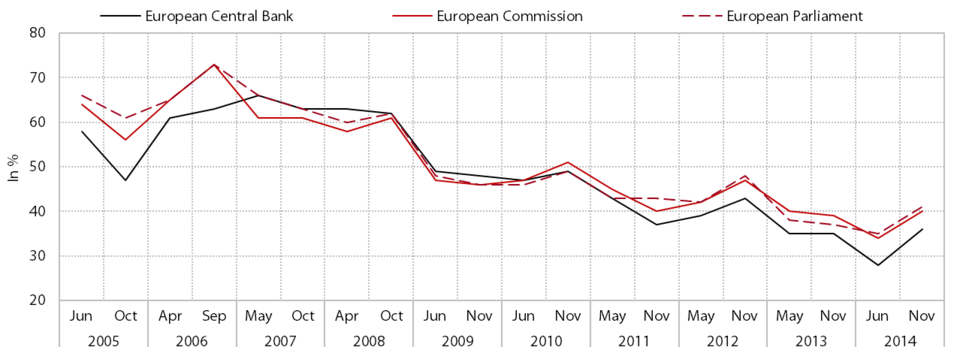
In 2014, people’s trust in institutions in Slovenia increased slightly, but remained low. Trust in key institutions in Slovenia and the EU has declined significantly since the beginning of the crisis. Over the whole period, people have put the lowest trust in political parties and the highest trust in the EU. At the latest measurement, trust in institutions increased relative to 2013, when it was at its lowest for the last ten years. The share of respondents who trust the parliament, the government and the EU was 3 percentage points higher year-on-year in November 2014; the share of those who trust the local authorities also rose slightly. The increased trust in institutions may be attributable to political changes, given that 2014 was a year of European, government and local elections. The level of trust in political parties, in contrast, remained low at the latest measurement.
Trust in national institutions is among the lowest in the EU. Trust in the government, political parties and local authorities remains below the EU average according to the latest survey, while trust in the parliament is the lowest in the entire EU. The low trust in institutions is to a great extent related to dissatisfaction with the current economic and political situation in Slovenia. According to the most recent Eurobarometer data, 57% of respondents in Slovenia are worried about unemployment, 47% about the economic situation and one quarter about the rising general government debt. At the same time, the majority of respondents think that the employment situation, the economic situation and their life in general will remain the same in the next twelve months.
Trust in EU institutions is higher. Respondents in Slovenia expressed the highest levels of trust in the EU parliament (41%) and the European Commission (40%), and a slightly lower level of trust in the central bank (36%), all these figures being similar to the EU average. Relative to the year before, in the latest measurement, the level of trust in all main institutions of the EU increased, but trust in EU institutions nevertheless remains much lower than before 2012.
Trust in EU institutions, Slovenia, in %
1 Greenhouse gas emissions
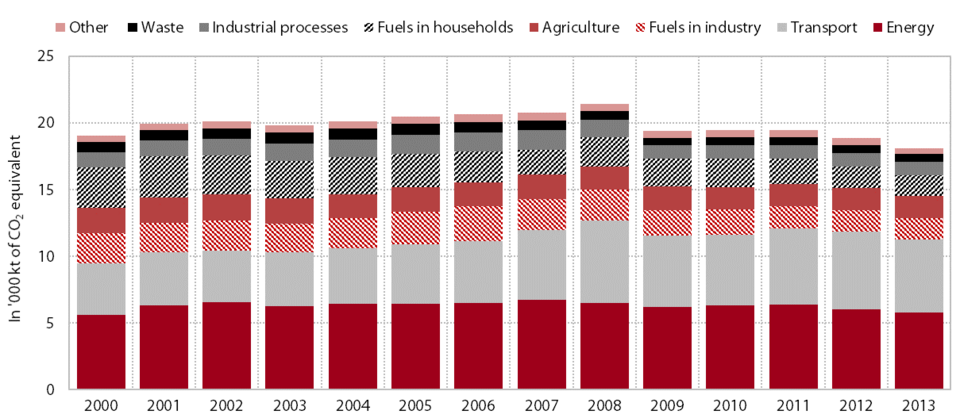
After declining in 2008 and remaining roughly unchanged for three years, total greenhouse gas (GHG) emissions fell again in 2013 for the second consecutive year. Total GHG emissions amounted to 18,112 kt of CO2 equivalent in 2013, which was again approximately 4% less than in the preceding year. Emissions declined across almost all emission source categories observed. Emissions from energy and transport, which account for almost two thirds of GHG emissions, dropped around 1 percentage point more than average emissions. Emissions from the energy sector were almost entirely due to generation in thermal power plants. When the largest power plant is shut down, they will drop even more. Transport emissions remain fairly high by international comparison, owing in part to the relatively favourable competitive conditions established through tax policies and strong transit flows through Slovenia. Emissions from other sources also declined in 2013, except emissions from industrial processes. These had also been slowly rising in previous years but had a relatively small impact on the movement of total emissions as their share was modest.
Emission intensity – which is relatively high in Slovenia – has been declining in the observed period since 2008, but the gap with the EU average increased. In 2013, the emission intensity of the Slovenian economy actually improved slightly again owing to somewhat lower emissions and almost unchanged GDP at constant prices, but Slovenia did not make significant progress in this area. Improvement is more visible over a longer period: amid a deep decline in GDP during the economic crisis, GHG emissions fell considerably, which moved Slovenia much closer to meeting its international commitments. With the emission intensity in the EU overall rising faster than in Slovenia, Slovenia's gap has nevertheless been widening. In 2000, Slovenia generated 14% more emissions per unit of GDP than the EU as a whole; in 2012, over a quarter more.
GHG emissions by emission source category, Slovenia
2. Emission-intensive industries
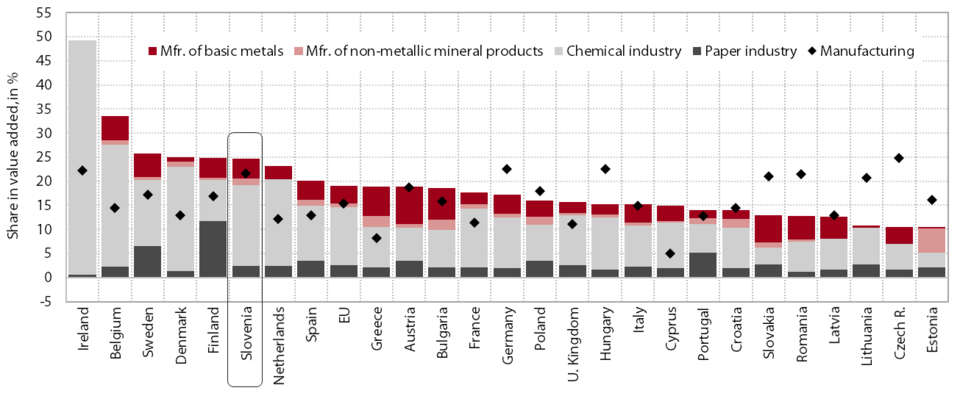
In the last few years, the total output of emission-intensive industries in Slovenia mostly grew faster than the average output of other manufacturing industries. The only exceptions were 2008 and 2009, primarily as a result of lower output in the manufacture of basic metals. In 2013, emission-intensive output increased further due to relatively strong growth in the chemical industry and in the manufacture of basic metals, while the average output in other manufacturing sectors production activity declined. The share of value added in emission-intensive industries in total value added in manufacturing amounted to almost a quarter (24.2%) and was one of the largest in the EU. Given the greater significance of emission-intensive industries and greater energy intensity of manufacturing in Slovenia than in the EU as a whole, emissions trading could have a greater effect on production costs and, consequently, business results and competitiveness than on average in the EU. To reduce exposure to higher costs, it is therefore crucial for Slovenia to continue to further reduce its energy intensity and proceed with technological restructuring in emission- and energy-intensive industries.
The share of emission-intensive industries in manufacturing and the share of manufacturing in the value added of the economy, 2012
3 Energy efficiency
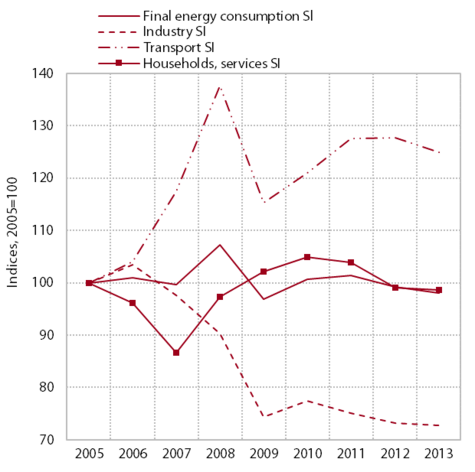
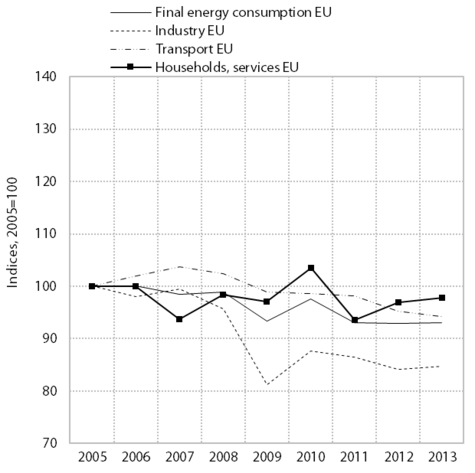
Reflecting weak economic activity, primary energy consumption decreased again in 2013, but energy intensity remained relatively high. Economic activity declined again in 2013 (by 1.0%), which was also indicated by lower primary energy consumption (by 2.0%). In 2014, the consumption of some energy products declined further despite economic growth (the consumption of coal and fuel oil by around a fifth, petrol and natural gas by around 5% and diesel fuel by around 1%). One of the targets of the EU climate and energy package for 2020 is a 20% reduction in energy consumption with regard to anticipated consumption according to the baseline scenario with no additional measures. This means that by 2020 two thirds of EU countries will have to reduce energy consumption relative to the base year of 2005, while those countries where a strong increase in energy consumption was anticipated according to the baseline scenario will have to limit growth. This also applies to Slovenia. Slovenia is allowed to increase primary energy consumption by 4.5% relative to 2005, while in the EU overall primary energy consumption should be reduced by 13.2%. The majority of EU countries are on track to meet the 20% target, partly as a result of the deteriorated economic conditions. To reach the targeted savings, Slovenia should not increase primary energy consumption by more than 9.1% in 2014–2020, while the EU as a whole should reduce it by 5.3%. In the last few years, energy intensity in Slovenia deteriorated significantly compared with the EU average, as it was falling more slowly than in the EU. Approximately until the middle of the previous decade, energy intensity in Slovenia had converged towards the EU average, exceeding it only by 15%, while in the few years that followed it was moving away from the EU average and was a quarter higher in 2013.
Regarding final energy consumption, Slovenia stands out particularly in the large share of energy consumption in transport. In 2005–2013, final energy consumption was falling by 0.3% per year in Slovenia; the decline in the EU overall was much larger (0.9% per year). Energy consumed by industry was otherwise falling faster (by 1.7 percentage points), but this improvement was cancelled out by a concurrent increase in energy used for transport (by 2.8% per year; in the EU: by 0.7%), which is mainly attributable to increasing freight transit through Slovenia. The targeted savings for EU countries set for final energy consumption show a similar picture to that in primary energy consumption.
Final energy consumption by consumer sector in Slovenia and the EU
4 Renewable energy sources
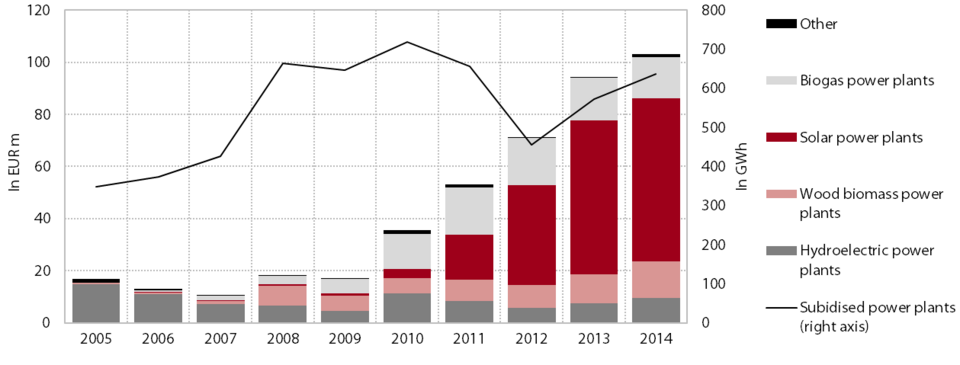
The share of renewable energy sources (RES) in final energy consumption continued to increase in 2013. It has been rising ever since 2009 for various reasons. Final energy consumption declined sharply because of the crisis, and the increase in the consumption of RES is mainly attributable to a broader capture of statistical data and, to some extent, to higher water levels. Amid a 1.7% decline in final energy consumption, the consumption of RES increased by 4.6% in 2013. The share of RES in gross final energy consumption thus rose to 21.5%. In 2014, hydroelectric power production was significantly above the average again (41% higher than foreseen and 29% higher than in 2013); there was also a notable increase in solar energy consumption. Partial data on energy supply indicate that energy consumption declined despite economic growth. The share of RES in gross final energy consumption is therefore estimated to have risen again (to around 23%). To comply with EU targets, Slovenia should reach a 25% share of RES in gross final energy consumption by 2020, while EU Member States should increase their average share from 15.0% in 2013 to 20% by 2020.
Slovenia has a two times higher share of RES in heating than the EU, an almost 50% higher share of RES in electricity consumption, while the share in transport is somewhat lower than in the EU; all three shares rose in 2013. The share of RES use in heating reached 31.7% in 2013. Slovenia is in the upper third of EU countries on this indicator, mainly thanks to the availability of wood for heating because of its large forest area. The largest part of RES used for heating is thus accounted for by solid biomass (92%); around 6% is contributed by geothermal energy and the rest by biogas and solar energy (collectors of solar heat). The share of RES in transport (3.4%) was slightly below the EU average (5.4%), but Slovenia was among the first ten EU countries in terms of RES use in electricity production (32.8%), owing mainly to the use of hydro-energy. Hydro-energy accounted for as much as nine tenths of total consumption of RES in electricity; 4.5% was contributed by solar energy and the rest by solid biofuels and other sources. Overall in the EU, hydro-energy contributed much less to electricity production from RES than in Slovenia, around 42%, a significant contribution (over 27%) being made by wind energy. .
Grants paid per unit of energy produced in subsidised RES power plants have increased significantly in the past few years because of a change in structure in favour of solar energy. In 2005, grants for promoting electricity generation from RES stood at EUR 16.8 m, the bulk being intended for hydroelectric power plants. Since 2010, the amount of RES grants has increased substantially, reaching as much as EUR 103.2 m in 2014, when grants for solar power plants predominated. With a shift towards more expensive energy sources, the amount of grants per unit of power generated from RES increased several-fold, to EUR 0.162/kWh in 2014.
Funds disbursed to support electricity production from RES, Slovenia
5 Share of road transport in total freight transport
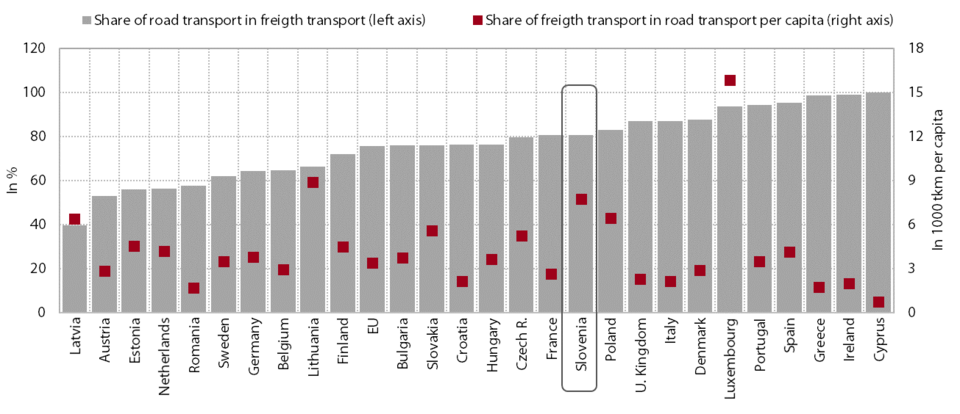
Although since 2009 the share of road freight transport has been slowly declining in Slovenia and across the EU, it has remained much larger in Slovenia than in the EU. While the share of road freight transport stagnated in the EU in the middle of the previous decade, it was rapidly rising in Slovenia, so that Slovenia exceeded the EU average in 2005 and maintained the gap of around 6 percentage points since 2009. In the first half of 2014, the number of tonne-kilometres performed by domestic freight carriers declined year-on-year (by 3.7%), while rail freight transport increased (by 14.4 %). The share of road freight transport thus fell to a still high 80% (in the EU as a whole, by around 5 percentage points less). We estimate that the annual volume of road freight transport remained below the pre-crisis peak, while the volume of rail freight transport – which is otherwise relatively low – was much larger. From the perspective of sustainable development, such restructuring in favour of rail transport is more favourable, but the continuation of this trend remains a challenge.
The volume of road freight transport per capita in Slovenia is among the largest in the EU, primarily owing to Slovenia's transit location and the density of its transport infrastructure. Freight transport by domestic carriers increased significantly, particularly in 2003–2008. In 2013, domestic carriers performed more than double the number of tonne-kilometres per inhabitant than, on average, carriers in the EU. The increase is attributable to Slovenia’s location at the crossing of the V and X trans-European corridors, where transport has also expanded significantly with the recent enlargements of the EU, and to a highly developed motorway network (the most extensive in the EU in per capita terms). The volume of railway freight transport per capita is also relatively large in Slovenia, where, alongside the railway network, the connection with the port of Koper also plays a significant role, as around 60% of the transit of goods through this port is transported by rail.
Slovenian road carriers perform more and more of their services abroad, while the share of freight transport carried out by foreign carriers on Slovenian roads is rising. This can be concluded based on a comparison of vehicle-kilometres travelled by domestic goods vehicles and vehicle-kilometres travelled on Slovenian roads by all goods vehicles. This trend continued after 2008. In 2008–2013, the total range of journeys (measured in kilometres) made by Slovenian carriers (in Slovenia and abroad) declined by almost 9%; the range of journeys performed in the territory of Slovenia by all carriers (including foreign carriers) declined to the same extent. Within that, the range of journeys performed by Slovenian carriers (solely) abroad increased by 22%, while the journeys made in the national territory and those that are at least partly connected to the territory of Slovenia (i.e. when goods are loaded or unloaded in Slovenia) declined by 19%. At the same time, transport by foreign carriers on Slovenian roads expanded, which is confirmed by data on the number of passages through toll stations, according to which the share of foreign freight vehicles on Slovenian motorways rose by 15 percentage points to 68% in 2008–2012.
Road freight transport in Slovenia and the EU
6 Environmental taxes
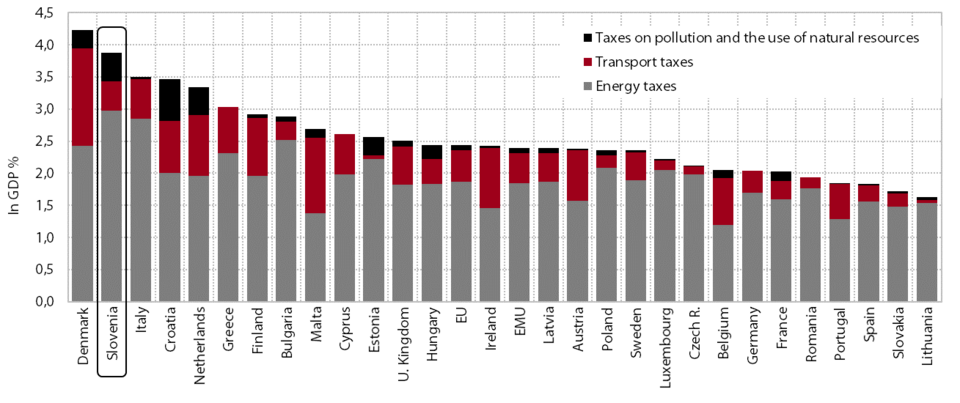
In 2013, revenue from environmental taxes rose for the second consecutive year and was more than a third higher as a share of GDP than in 2000. In 2013, revenue from these taxes was 4% higher than in 2012 and a quarter higher than in 2008. As a share of GDP, it was up more than a third relative to 2000, which is mainly related to increased revenue from energy taxes. In contrast to previous years, the increase in 2013 was due to higher revenues from transport taxes (by 13.8%) and taxes on pollution and the use of natural resources (by 45.2%). Revenue from energy taxes, the largest category of environmental taxes, declined by 1.6%. This was attributable to a fall in revenue from excise duties on energy products, which followed the decline in the quantity of fuels released for consumption after excise duty rates were raised. The negative impact of this fall was mitigated by revenue from the sale of the remainder of emission allowances, which has been possible since that year.
The share of environmental taxes in GDP in Slovenia is above the EU average, which is attributable to higher energy consumption. In the past few years, the gap in environmental taxes as a share of GDP between Slovenia (3.9%) and the EU average (2.4%) has been widening. It is mainly explained by the high revenues from energy taxes in Slovenia related to the extensive consumption of energy products in road transport due to a large volume of transit traffic, the dispersed settlement pattern and poorly developed railway infrastructure. The implicit tax rate on energy – which measures the value of environmental taxes per unit of final energy consumption and thus excludes the volume of energy consumed as a tax burden factor – indicates that in 2012, the tax burden on energy products in Slovenia (EUR 172.2/tonne) was comparable with the weighted EU average (EUR 172.8/tonne).
Most of the environmental tax burden is borne by households, as the majority of energy and transport taxes fall on households. As in previous years, in 2012, 70% of the total environmental tax burden fell on households, according to SURS data. This can be attributed in part to methodological simplification, which ascribes most of motor fuel consumption and hence energy taxes to households. Among environmental taxes that burden the economy, the most important ones are taxes on energy, which are to the greatest extent paid by the manufacturing sector. They are followed by taxes on transport and taxes on pollution, which, within the economy, mostly burden the sale, maintenance and repair of motor vehicles. Most of the burden of taxes on the use of natural resources is borne by companies in the electricity, gas and steam supply sector.
Revenue from environmental taxes, Slovenia and the EU, 2013
7 Agricultural intensity
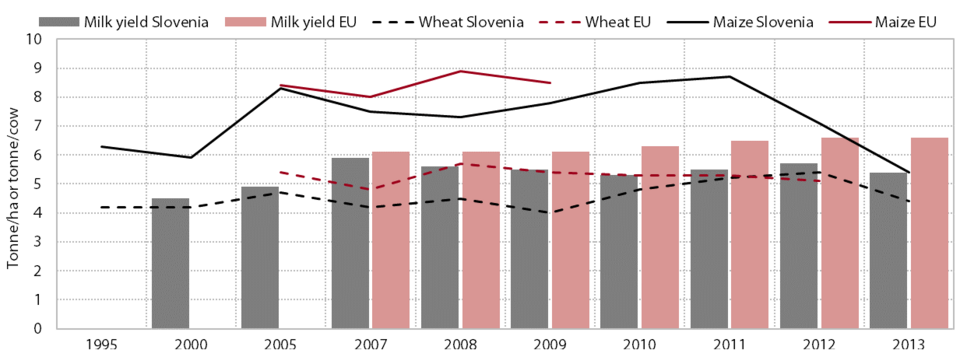
The consumption of mineral fertilisers, which is declining in the long term, rose slightly in 2013. Agricultural producers used around 130,000 tonnes of mineral fertilisers in 2013, 1.5% more than in 2012. The consumption of main macronutrients (NPK fertilisers, i.e. nitrogen, phosphorus and potassium), which accounted for around one third, rose even slightly more, by approximately 2.5% per unit of utilised agricultural area (UAA). In the long term, both the total consumption and the consumption per unit of UAA are falling relatively rapidly. In 2013, the latter was more than a tenth lower than in the last ten years as a whole.
Pesticide consumption, which is falling even faster in the long term, decreased further in 2013. The total quantity of active ingredients in pesticides sold was around 918 tonnes, but it was not used solely in agriculture. Pesticide sales were thus approximately a tenth lower than in 2012. The majority were fungicides for plant disease control, followed by herbicides for weed control. The quantity of pesticides sold has been falling relatively rapidly in the long term. In 2013, it was a quarter below its ten-year average.
Agricultural efficiency, as measured by average yields of the most important crops, the number of animals per unit of utilised agricultural area and milk yield per animal, deteriorated on most indicators. The average yield of crops per hectare declined due to bad weather conditions, by a fifth in wheat and around a quarter in maize. In both it was also down compared with the ten-year average, which indicates a lower level of exploitation of natural resources than in previous years. In contrast, the environmental burden per output measured by the number of animals per unit of area is relatively high, although it declined a little in 2013. Intensity in milk production also decreased, by around 6%. As it is relatively low, this is not favourable from the perspective of the environmental burden per output.
While integrated farming declined slightly, organic farming rose significantly again. The total area of agricultural holdings involved in controlled sustainable (integrated and organic) farming grew by around 3% in 2013. The area cultivated using integrated methods was down again somewhat, while the area cultivated organically, which is one of the most effective methods of sustainable use of natural resources, was up by a tenth. A large majority of this area is permanent grassland intended for animal production, while the fastest growth is recorded for other types of land where production is driven by high demand. The total organic crop production rose by 15% in 2013. The organic production of animals and aquatic organisms also increased.
Average yields of main crops and milk production
8 Intensity of tree fellings
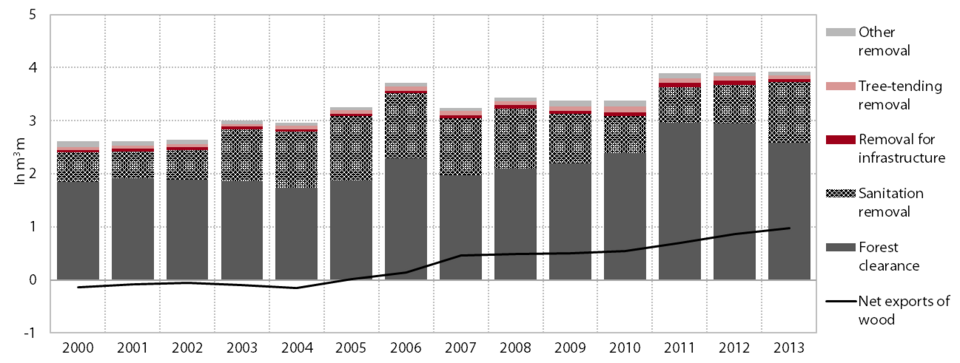
Tree felling, which is rising in the long term, remained almost unchanged in 2013 and relatively low in terms of potential felling; the intensity of tree felling also remained almost the same. Slightly more than 3.9 m3 of wood was removed, which is, for the second consecutive year, approximately the same as in the preceding year but approximately half more than in 2000. As potential felling according to the forestry management plans also rose in this period, the gap between actual felling and potential felling did not narrow. In 2013, 65% of potential felling was carried out (a year earlier, 68%), the shortfall being mainly due to insufficient tree felling in private forests. Most of the removal was for tree-tending and sanitation purposes, while felling for forest clearance, regeneration and infrastructure was relatively insignificant. With around 1% larger annual wood increment, the intensity of tree felling – which had previously been rising – also remained roughly the same at 46%. This is much lower than envisaged in the Action Plan to Increase the Competitiveness of the Forest-Wood Chain in Slovenia by 2020, according to which tree-felling intensity could be increased to 75%. Without jeopardising the stability of forests and their habitats, 6.5 million m3 of wood could be cut per year. As much as 40% of the total wood area was affected by the ice storm at the beginning of 2014, which will be reflected in both environmental and economic indicators for forestry in 2015 and in the years to come.
Although tree felling remained unchanged, the production of raw wood categories increased, but owing to higher exports, the untapped potential in the forest-wood chain did not decline. Around 3.5 million m3 of roundwood was obtained, approximately 5% more than a year earlier. The production of wood used for industrial processing, which is of higher quality, increased; the volume of wood used for heating rose even more. More wood was exported than in previous years, so that exports accounted for as much as 44% of production in 2013 (in the previous year, 4 percentage points less). Net exports of wood, having been rapidly rising since 2006, were up 13% in 2013. Their structure has deteriorated significantly in this period. The share of wood for heating fell from one third to one tenth of total net exports, the share of saw logs and veneers, i.e. the highest-quality wood, which can reach the highest value added, increased from less than half to more than two thirds. While this wood represented as much as 46% of exports, it accounted for only 9% of imports. At the same time, more than four tenths of imports were the lowest-quality wood for heating. Such movements are however highly unfavourable from the aspect of achieving higher value added in other sectors up the forest-wood chain.
Tree felling, its structure and net exports of wood, Slovenia
9 Regional variation in GDP per capita
Economic activity as measured by the real GDP growth rate was still negative in 2013 in most regions. The lowest economic activity was again recorded by the Zasavska region, which also had the lowest GDP per capita of all regions. It was more than a third lower than the national average. For the third year in a row, the Zasavska region was surpassed by the Pomurska region, which is traditionally the lowest-ranking region on this indicator but had positive economic growth in 2013. In all other regions activity declined again but – with the exception of Koroška – not so much as a year earlier.
Progress in converging to the EU average in terms of per capita GDP, which had been achieved by Slovenian regions by 2008, was cancelled out during the crisis. Both cohesion regions retained their gaps with the EU-28 average in 2013, Zahodna Slovenija at 97% and Vzhodna Slovenija at 68% (compared with107% and 73%, respectively, in 2008). Since 2008, the gap with the EU average has been widening across all regions, notably those of Zahodna Slovenija, particularly the Obalno-kraška region. The latter increased its gap relative to 2008 by 18 index points in 2013 and thus returned to the comparable level in 1995. These movements eased slightly in 2013, when the gap was widened only by a few regions. The only region to still exceed the EU-28 average was the Osrednjeslovenska region, but its advantage over 2008 (when it still exceeded the EU-28 average by 28%) also declined, by as many as 12 index points.
Interregional disparities continued to decline during the crisis. The relative dispersion of GDP per capita has been declining since 2008 according to our calculations, but not so much as a result of more even development across regions as because economic activity fell most in those regions that generate the largest share of Slovenia’s GDP and also have the highest per capita GDP. The relative dispersion in Slovenia is among the lowest in the EU. The ratio between the two regions with extreme values of per capita GDP is also relatively low compared with other countries in the EU, where the differences may also be 10-fold (e.g. the United Kingdom). In 2013, it rose from 1:2.2 to 1:2.3, after being practically unchanged in previous years. Taking into account the differences in purchasing power across regions, the actual ratio is even lower.
10 Regional variation in the registered unemployment rate
In 2014, the increase in the registered unemployment rate in regions slowed slightly or even stopped. It declined across the majority of regions, the most in the Koroška region (by 0.9 percentage points). The largest increase was in the Zasavska region (by 1.1 percentage points), where the rate also rose the most relative to 2008 (by 9.5 percentage points), as economic activity in this region has been rapidly falling ever since the beginning of the crisis and was among the lowest among all regions. The smallest increase in unemployment in this period was in the Gorenjska region (by 5.2 percentage points). All regions with above-average registered unemployment rates are in the cohesion region of Vzhodna Slovenija, except Notranjsko-kraška region, but there too the rate has been markedly rising since 2008. The Pomurska region has recorded the highest unemployment rate for years, while the Gorenjska region had the lowest rate in the last four years.
Regional disparities in registered unemployment rates declined further in 2014, which is attributable to a faster increase in unemployment in regions with below-average rates. The measure of absolute dispersion, by which regional disparities in the unemployment rate are measured, was 1.7 in 2014 (0.1 lower than in the previous year). Regional disparities have been gradually declining since 2008 (except in 2009 and 2010), which was largely the result of a faster increase in registered unemployment in the regions of Zahodna Slovenija with below-average rates. The ratio between the two regions with extreme values has also been falling. Pomurska recorded a 1.9 times higher registered unemployment rate than Gorenjska in 2014 (in 2013, 1.8 times higher and in 2008, 2.9 times higher). The regional variations in other rates of registered unemployment (for women, young people, long-term unemployment) are also marginal.
In all regions, the greatest burden of unemployment is borne by young people. The shares of young people under 29 years of age and unemployed persons with at least a higher education rose the most relative to 2013 in 2014. These are also often young and first-time jobseekers. The largest shares of unemployed under 29 were in the Zasavska (30%) and Koroška regions (29.3%). The Osrednjeslovenska region recorded the largest share of unemployed persons with a tertiary education (almost a fifth), while the largest increase in both the number and share of young unemployed was in the Spodnjeposavska region.

